 05/12/2008 13:38 05/12/2008 13:38 |
|
| | | OFFLINE | | Post: 15.886 | Registrato il: 28/08/2005
| Utente Gold | |
|
 Posted in the preceding page
Posted in the preceding page:
Two articles, translated from today's issue of L'Osservatore Romano, by Lucetta Scaraffia and Cardinal Ruini
on Benedict XVI's concept of inter-religious dialog [which places Dominus Iesus in a new light),
and Marcello Pera's book.

OR today.
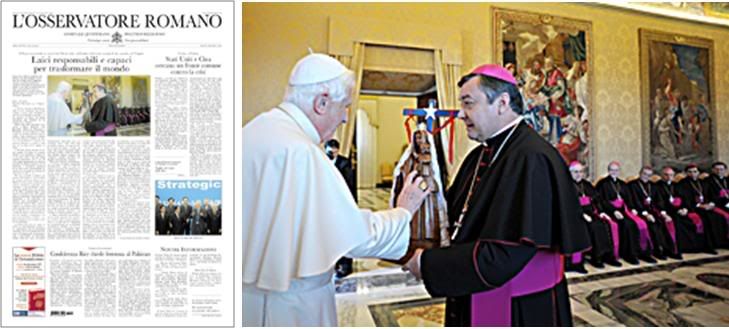
The Pope urges Chilean bishops to be examples of living according to the Gospel:
'Towards responsible laymen able to transform the world'
Other Page 1 stories: The start of a China-US economic conference for a common front against the current global crisis;
and Condoleeza Rice asks Pakistan to stand firm against terrorism.
THE POPE'S DAY
At 9 a.m., the Holy Father and members of the Roman Curia gathered at the Redemptoris Mater chapel to listen
to the first Advent homily by the Preacher of the Pontifical Household, Fr. Raniero Cantalamessa, O.F.M. Cap.
who spoke on the Bible passage from St. Paul: "When the fullness of time had come, God sent his Son, born of
a woman" (Gal 4,4).
The Holy Father met today with
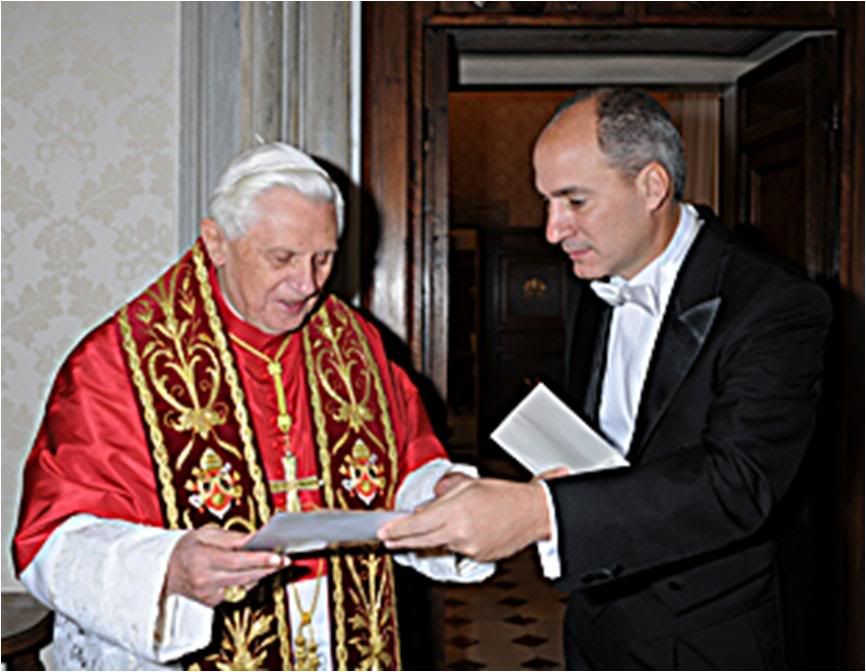
- H.E. Juan Pablo Cafiero, Ambassador of Argentina, who presented his credentials. Address in Spanish.
- Mons. Alessandro D’Errico, Apostolic Nuncio in Bosnia-Herzegovina;
- H.E. Georges Santer, Ambassador of Luxembourg, on farewell visit.
- H.E. Anne Maree Plunkett, Ambassador of Australia, om farewell visit.
- Members of the International Theological Commission. Address in Italian.
- Members of the Equestrian Order of the Holy Sepulchre of Jerusalem. Address in Italian.
The Vatican Press Office released the messages of condolence fromt eh Holy Father, Cardinal Bertone
and Cardinal Kasper on the unexpected death of Patriarch Alexei-II of Moscow. [See NOTABLES for initial stories;
and later post below for subsequent stories.]
The Holy Father has named Mons. Karl Golser to succeed the late Mons. Wilhelm Egger as Bishop of Bolzano-Bressanone.
Mons. Golser, 65, has been a professor of moral theology at the Theological Academy of Bressanone and president since 2006
of the Italian Theological Association. He was an official of the Congregation for the Doctrine of the Faith from 1977-1982 and is the author
of several books on moral theology.
Pope Benedict says the task
of theologians is to reflect
on the truth taught by the Church
By Cindy Wooden
 A full translation of the Pope's address to the theologians has been posted in HOMILIES, DISCOURSES, MESSAGES.
A full translation of the Pope's address to the theologians has been posted in HOMILIES, DISCOURSES, MESSAGES.
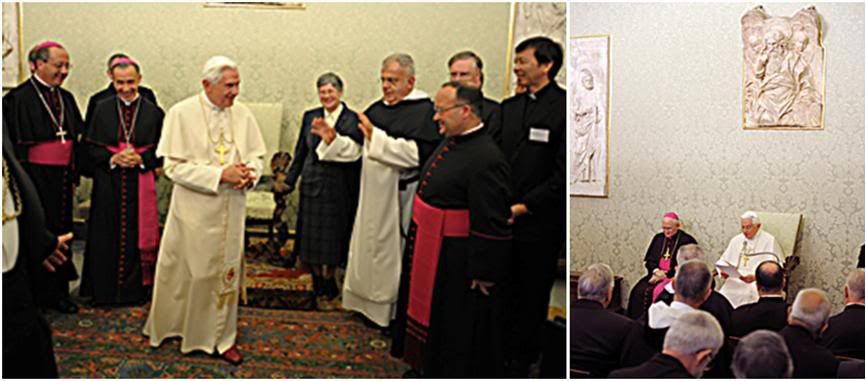
VATICAN CITY, Dec. 5 (CNS) -- While theologians can make valuable contributions to society's reflections on justice, peace and ecology, their main task is to reflect on the truth of Christian revelation and not simply its practical applications, Pope Benedict XVI said.
"The essential and inescapable characteristic of theology is to ask questions concerning the truth of faith and not simply to ask questions about its practical and social effectiveness," the Pope said Dec. 5 during a meeting with the International Theological Commission.
The 30 members of the commission, appointed by the Pope, were concluding their five-year terms on the board that investigates theological questions in coordination with the Congregation for the Doctrine of the Faith.
During their Dec. 1-5 meeting, the theologians concluded work on a document titled "In Search of a Universal Ethics: A New Look at Natural Law," and continued work on a document on "The Meaning and Method of Theology."
Archbishop Luis Ladaria Ferrer, secretary of the doctrinal congregation and secretary-general of the theological commission, told the Pope that the natural law document would be reviewed by the doctrinal congregation prior to publication and that work on the document on the role of theology would continue.
Pope Benedict told commission members the meaning and role of theology was an especially important topic in today's world.
"In a planetary society like the one being formed today, theologians often are challenged by public opinion to promote dialogue among religions and cultures (and) to contribute to the development of an ethics that has peace, justice and the defense of the natural environment as its basic coordinates," the Pope said.
"Obviously," the Pope said, "these are legitimate concerns that certainly must be given careful consideration. Yet one cannot deny that the identity of theology is not found on this level of problems and needs."
Theology must focus on the truth revealed in Jesus Christ and taught by the Church, Pope Benedict said.
"The basic virtue of the theologian is to seek obedience in faith, which makes him a collaborator in the truth" and ensures that the theologian is not talking about himself, but about God, the Pope said.
"Obedience to the truth does not mean renouncing research and the effort of reflection," he said, but rather it means allowing questions to stimulate deeper faith.
Pope Benedict also spoke briefly about the new document on natural law - meaning, the sense of moral right and wrong which the church teaches is present naturally in each human being.
If each person and each society recognized the tenets of natural law, he said, it would guarantee that everyone's freedom and dignity would be recognized and it would protect them from "ideological manipulation and exploitation" by those who happen to have more power.
Be ambassadors of peace and love,
Pope exhorts Holy Sepulchre Knights
 A full translation of the Pope's address to the Knights has been posted in HOMILIES, DISCOURSES, MESSAGES.
A full translation of the Pope's address to the Knights has been posted in HOMILIES, DISCOURSES, MESSAGES.
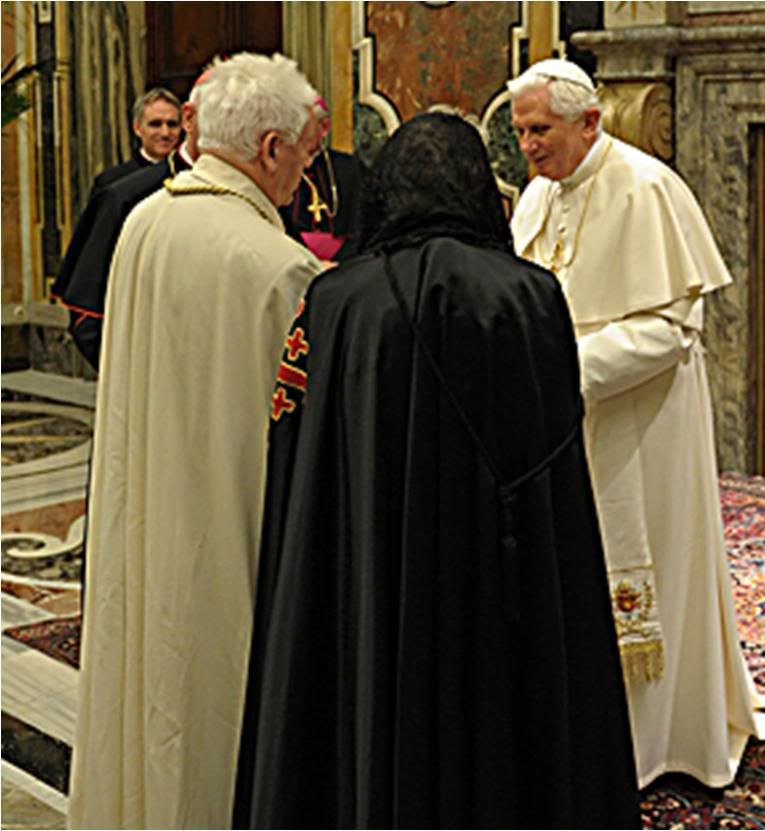
Vatican City, Dec 5, 2008 (CNA) - Today the Holy Father exhorted members of the Equestrian Order of the Holy Sepluchre to become “sincere ambassadors of peace,” especially in communities “weighted down” with “uncertainty and danger.”
The Order, which convenes every five years, is currently meeting in Rome to assess the situation of the Catholic community in the Holy Land, study the activities of the Order and establish guidelines for the future.
Speaking at their meeting today, the Holy Father referred to the history of the Order, which was established to be "a 'guard of honor' for the protection of the Holy Sepulchre,” the church that surrounds both Calvary and the tomb of Jesus. Since its founding, the Order has been supported by the Popes to carry out their “specific form of service.”
After reminding members of the order to keep Christ as the center of their lives, the Pope then challenged the knights to be “builders of a tangible hope," aiming to create a “new humanity inspired by the evangelical values of justice, love and peace. How much need for justice and peace the Land of Jesus has!" the Pontiff exclaimed. "Continue to work to this end, and never tire of praying ... for this aspiration to be realized.
"Ask the Lord to make you 'convinced and sincere ambassadors of peace and love among your brothers and sisters'. Ask Him,” the Holy Father continued, “with the power of His love, to favor your constant work in support of the ardent desire for peace in those communities, weighted down over the years by a climate of uncertainty and danger."
The Holy Father then called to attention the plight of Christians throughout the world.
“My affectionate thoughts go out to those dear Christian peoples who continue to suffer because of the political, economic and social crisis of the Middle East, made even more burdensome by the grave situation in the world. And I reserve a particular expression of spiritual closeness for our many brethren in the faith who have been forced to emigrate. How can we not share the suffering of those communities so sorely tried?"
The Pope concluded by recalling the struggles of those who live in the Holy Land, especially Bethlehem and “all places sanctified by the passage of the Redeemer.” He also asked the Virgin Mary “to make us aware of her maternal protection for our brothers and sisters who live there and have to face no small number of difficulties every day."
I wonder what the Order can do to reconcile the warring factions of the various Christian orders who have 'custodial' rights within the Church of the Holy Sepulchre. The enmity among some of them - which resulted in some monks physically slugging each other in a recent brawl inside the Church - is so dreadfully un-Christian.
[Modificato da TERESA BENEDETTA 06/12/2008 03:57] |
|
 05/12/2008 15:39 05/12/2008 15:39 |
|
| | | OFFLINE | | Post: 15.887 | Registrato il: 28/08/2005
| Utente Gold | |
|
 The Encyclical on social doctrine can wait -
The Encyclical on social doctrine can wait -
but world attention for poor countries can't
Economist Ettore Gotti Tedeschi makes a front-page proposal in L'Osservatore Romano for immediate financing
and investment in three billion poor people who can be helped with micro-credit to improve their lives.

ROME, December 5, 2008 – Rumors have been floated over the past year that Benedict XVI's encyclical on social doctrine is due to come out 'soon'.
The news is, of course, not unfounded. The last socio-economic encyclical – Centesimus Annus by John Paul II – goes back to 1991, and many in the Curia consider it outdated.
The Vatican offices most active in this area, especially the Pontifical Council for Justice and Peace headed by Cardinal Renato Martino, are bent on having a new encyclical on the subject from Pope Benedict XVI.
In reality, rather than being outdated, Centesimus Annus has never been seriously accepted by the hierarchy or by Catholics as a whole. It has been judged as too friendly toward the capitalist system. The current collapse of the global economy is held by many to be proof of this negative view.
The fact is that three drafts of a new social encyclical have already come to the desk of Benedict XVI. And three times the Pope has sent them back, unsatisfied.
As a theologian, Ratzinger has dealt only marginally with social doctrine and economic questions. As Pope, he dedicated his first encyclical to charity, and the second to hope. It follows that one would expect him to dedicate the third to faith, rather than to social doctrine.
On the other hand, a few points of social doctrine are included in the second part of Deus Caritas Est, the section of the encyclical that most reflects the work of the Vatican offices.
But the first part of Deus Caritas Est and all of Spe Salvi, are entirely Ratzingerian in character. It seems unlikely that Benedict XVI would attach his signature to a third encyclical that does not say anything original, nor bear his extremely strong personal imprint.
Moreover, the element of surprise cannot be overlooked. No one expected Spe Salvi. The Pope wrote it unheralded and promulgated it without submitting it for "editing" by the Curia. There is no reason why his next encyclical should also be out of the ordinary.
But does that mean that nothing can be expected from the Holy See, in the near term, on questions regarding the contemporary turmoil in the global economy?
Yes and no. One must be careful in speculating about an imminent papal encyclical. But on lower levels of authority, the Vatican has not been silent.
Last November 22, for example, the Pontifical Council of Justice and Peace published a document on finance and development that took up two whole pages of L'Osservatore Romano.
The long document – ambitiously entitled "A new pact to reestablish the international financial system" – was prepared for the conference organized by the United Nations in Doha, from November 29 to December 2, 2008, on development aid for poorer countries.
But these curial documents are doomed to leave no trace behind. Very few read them. And those who do have to fight off yawning.
The Holy See, hoever, has a more effective way of expressing itself. For a few months, the Osservatore has had a columnist of the highest authority on global economic questions: Ettore Gotti Tedeschi, an economist and banker, the president of Banco Santander Central Hispano in Italy.
Gotti Tedeschi is a Catholic, but obbiously is not a man of the Curia. Most of the Curia look at him with critical detachment. He writes under his own personal responsibility. But his writings are really thought-provoking.
He is lucid in his analysis, and original in the solutions he proposes. In essence, his short columns have a much greater impact than pages and pages of tedious documents.
What follows is a sample of this - his commentary published on Thursday, December 4, on the front page of the Pope's newspaper:
Development and financial crisis:
The 'bubble' that will save us
by Ettore Gotti Tedeschi
Translated by Matthew Sherry from

In order to absorb the financial bubble that is threatening the entire world, they are thinking in the United States about producing a new one – possibly involving energy, or the automotive market – using the only form of liquidity available, Chinese capital.
The new bubble would probably ignore even more that part of the world which is excluded from prosperity. But instead of this, a creative economic process of global dimensions could be created that would re-establish more sustainable growth.
In other words, a bubble of solidarity that would include poor countries. A humanitarian bubble that would correct the error of the past bubble of egotistical development, the result of the crisis of human values.
The economic phenomena that are most worrying today, apart from the crisis of liquidity, are: difficulties in getting credit because of the prospect of recession; the negative trend in the stock market; the collapse of demand and consumption; the resulting overcapacity in production and the rise of unabsorbed fixed costs; the specter of unemployment.
How can the balance between productivity, employment, and purchasing power be restored to support the activity of companies listed on the stock market?
There is a courageous response, and it's not a short-term measure: to develop the potential demand on the part of poor countries, making it possible for them to participate in the global recovery plan thanks to their unexpressed demand, a demand that would have to be fostered and financed.
What this means is a project for a humanitarian bubble. But the problem of how to finance it remains.
The financial bubble that was maintained until just recently in the United States – that of "subprime" mortgages – was founded on the hope of higher returns on housing values, while underestimating risk.
The humanitarian bubble could, analogously, be founded on the hope of higher returns and investment values in countries populated by people full of dignity and wanting to improve their lives.
Asia has liquidity, the United States has technology, Europe has heart, ideas, and entrepreneurial initiatives on the small and medium scale.
Poor countries have two or three billion candidates for economic progress, who could be the recipients of investment in a long-term perspective.
So instead of another corrective, egotistical, short-term bubble, why not consider a long-term bubble of solidarity, which would generate growth in production and manual labor by financing consumption and investment in poor countries?
This would permit, in a few years, about three billion people to participate in the growth of the entire economic system. These same people are ready, now, to represent the essential 'demand' for Western products, and to participate in projects for infrastructure and production, for professional formation and scientific research.
This project would need to be financed over the long term, and with extremely low taxation. This means a greater commitment on the part of governments, but the same governments that guaranteed the "subprime" mortgages could easily guarantee infrastructure projects.
They could, with a little effort, guarantee production projects to be undertaken as joint ventures in poor countries and in key sectors like food. One successful example is constituted by Grameen-Danone Food in Bangladesh.
Schools and banks could be planned and created as joint ventures. Above all, investment could focus on the internet and electronic commerce, to help those populations enter directly into the commercial circuit with quality controlled products.
Now that we are becoming poorer, supporting truly poor countries would have a relative cost, but it would pay off enormously. How much has the "subprime" mortgage bubble cost in the United States alone? Ten trillion dollars? And how much has been invested in poor countries over the last ten years, to allow them to participate in economic growth?
Today, we are happy that a prosperous China – aided by the West to develop economically – is participating in the solution of the global crisis, but one could imagine a future with a rich Africa, a rich southeast Asia, or a rich Latin America.
To the objections about the lack of funding and the excessive risks, one could respond with the microcredit initiatives conducted by Nobel peace prize winner Muhammad Yunus: risk is low among poor peoples. They offer a higher form of collateral: their very lives.
Real bubbles, the negative ones, are produced when prices and market conditions are distorted, not when billions of people are gradually helped to enter into the economic cycle. They would constitute a source of wealth for us, including on the moral level.
So this would be a bubble of solidarity, a humanitarian bubble, which would not be risky at all, but on the contrary could save us.
NB: When I was translating the title of this article for the daily Page 1 summary of OR news yesterday, I had a problem with the word 'bolla', translated above throughout the article as 'bubble', which is, of course, one of the several meanings of the word. (Another meaning, for instance, is 'bull' or official proclamation, as in papal bull.)
For purposes of brevity, I translated the concept as 'a global rescue credit risk', because in effect, that is what is meant - a risk taken in the form of a binding financial investment (credit, loan, speculation, derivative, etc).
Somehow to refer to all this as a 'bubble', even when it is meant positively as in the case of the 'humanitarian bubble' proposed, is semantically misleading because it implies something extremely tenuous and empty! You can see one of the practical problems of translation here, where literalness can be counter-productive.
[Modificato da TERESA BENEDETTA 05/12/2008 20:09] |
 05/12/2008 17:05 05/12/2008 17:05 |
|
| | | OFFLINE | | Post: 15.889 | Registrato il: 28/08/2005
| Utente Gold | |
|
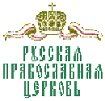
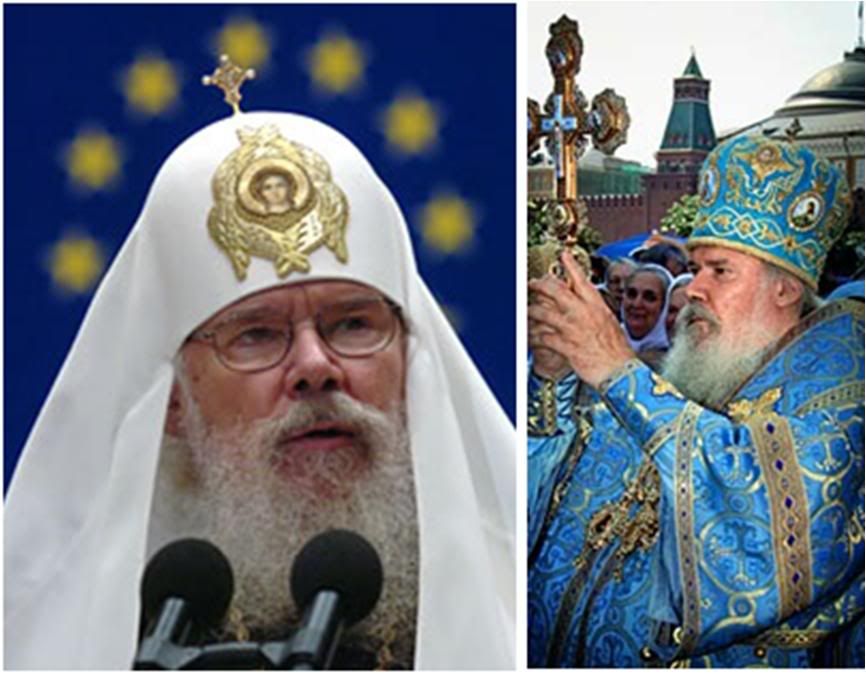 POPE BENEDICT MOURNS
POPE BENEDICT MOURNS
THE DEATH OF ALEXEI-II
The Vatican has now released Benedict XVI's message, sent in English, on the death of Patriarch Alexei-II:
To the Holy Synod of the Russian Orthodox Church
I was profoundly saddened to receive news of the death of His Holiness Alexy II, Patriarch of Moscow and of All the Russias, and with fraternal affection I wish to convey to the Holy Synod and to all the Members of the Russian Orthodox Church my most sincere condolences, assuring you of my spiritual closeness at this very sad time.
In my prayer I beseech the Lord to welcome into his Kingdom of eternal peace and joy this tireless servant, and to grant consolation and comfort to all those who mourn his passing.
Mindful of the common commitment to the path of mutual understanding and cooperation between Orthodox and Catholics, I am pleased to recall the efforts of the late Patriarch for the rebirth of the Church, after the severe ideological oppression which led to the martyrdom of so many witnesses to the Christian faith.
I also recall his courageous battle for the defence of human and Gospel values, especially in the European Continent, and I trust that his commitment will bear fruit in peace and genuine progress, human, social and spiritual.
At this sad time of loss, as his mortal remains are consigned to the earth in the sure hope of resurrection, may the memory of this servant of the Gospel of Christ be a support for those who are now in sorrow and an encouragement for those who will benefit from his spiritual legacy as leader of the venerable Russian Orthodox Church.
With fraternal affection in the Risen Lord,

Cardinal Tarcisio Bertone, as Secretary of State, also sent this message in Italian to the Holy synod of the Russian Orthodox Church:
INFORMED OF THE SORROWFUL DEPARTURE OF HIS HOLINESS ALEXEI-II, PATRIARCH OF MOSCOW AND ALL THE RUSSIAS, I WISH TO EXTEND MY SENTIMENTS OF FRATNERAL PARTICIPATION IN THE SORROW OF THE RUSSIAN ORTHODOX CHURCH AT A TIME WHEN IT ENTRUSTS ITS PASTOR TO THE PATERNAL AND MERCIFUL ARMS OF GOD.
I JOIN AFFECTIONATELY IN PRAYING TO GOD SO THAT PATRIARCH ALEXEI II MAY ENCOUNTER IN THE LIGHT OF ETERNAL LOVE THE RISEN CHRIST WHOM HE SERVED IN LIFE, AND I INVOKE DIVINE GOODNESS THE SUPPORT OF CHRISTIAN HOPE AND THE STRENGTH TO CONTINUE THE PATH OF EVANGELIZAL WITNESS IN THE WORLD.
CARDINALE TARCISIO BERTONE
SECRETARY OF STATE
TO HIS HOLINESS BENEDICT XVI
Initial stories about the Patriarch's death were posted in NOTABLES. This CNS story placed the event in the context of Orthodox-Catholic relations.
Head of Russian Orthodox Church
dies at age 79
By Carol Glatz

VATICAN CITY, Dec. 5 (CNS) -- The head of the Russian Orthodox Church, Patriarch Alexy II of Moscow, died Dec. 5 at his home outside the Russian capital. He was 79.
Although the cause of his death was not immediately made public, he had suffered from a heart condition and had been ill for some time.
Patriarch Alexy led the world's largest Orthodox church since 1990. As primate of the Russian Orthodox Church, the Patriarch was the spiritual leader of more than 110 million church members in Russia, the former Soviet republics and the diaspora.
He led his Church through the difficult transition from the end of Soviet repression to an era of religious freedom and sought to revitalize traditional religious values in a society that was still grappling with the after-effects of totalitarianism and the impact of newfound freedoms.
Pope Benedict XVI praised the Patriarch's efforts "for the rebirth of the church after the severe ideological oppression which led to the martyrdom of so many witnesses to the Christian faith."
In a written message sent to the Holy Synod of the Russian Orthodox Church today, the Pope offered his "most sincere condolences" and said he "was profoundly saddened" to receive news of the Patriarch's death.
He recalled Patriarch Alexy's "courageous battle for the defense of human and Gospel values," especially in Europe.
In his message, the Pope said he prayed the Patriarch's hard work would "bear fruit in peace and genuine progress -- human, social and spiritual."
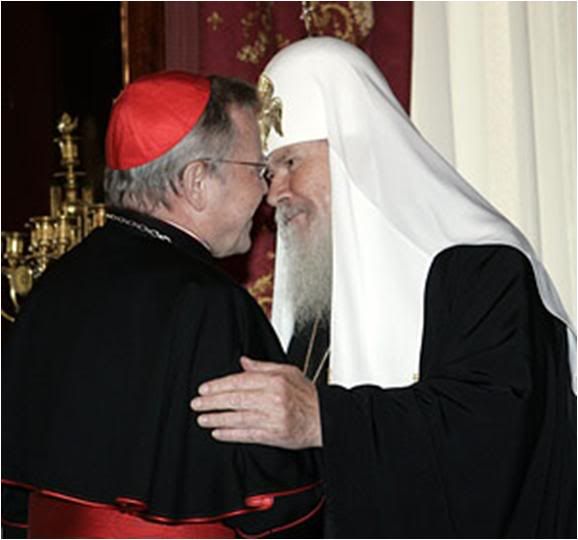 Cardinal Kasper, at his last meeting with the Patriarch in Moscow, October 2008.
Cardinal Kasper, at his last meeting with the Patriarch in Moscow, October 2008.
Cardinal Walter Kasper, the Vatican's top ecumenist, expressed his "profound sadness" at the Patriarch's death and prayed that he would "be rewarded for his long and dedicated ministry to the Church he loved."
Despite challenges and obstacles between the two Churches, the Patriarch held a firm desire to strengthen collaboration with the Catholic Church, Cardinal Kasper said in a statement today.
"His personal commitment to improving relations with the Catholic Church, in spite of the difficulties and tensions which from time to time have emerged, has never been in doubt," the cardinal said.
Cardinal Kasper said that during his many meetings with the Patriarch the Orthodox leader would "always make a point of expressing his good will toward the Holy Father."
He said Patriarch Alexy helped guide the Russian Orthodox Church during the post-communist transition and enabled it to emerge with "renewed interior vitality."
"He was instrumental in fostering the enormous growth of dioceses, parishes, monasteries and educational institutions, which have given new life to a Church sorely tested for so long," the cardinal said.
Despite the late Pope John Paul II's long-expressed desire to visit Russia, the Russian Orthodox under Patriarch Alexy never invited him to Russia. They insisted the Patriarch would not meet the Pope until they were satisfied that Catholics were not proselytizing in Russia.
Though still strained, Russian Orthodox relations with the Catholic Church improved greatly under Pope Benedict. After recent meetings this year with Russian Orthodox leaders, Cardinal Kasper, president of the Pontifical Council for Promoting Christian Unity, said historical tensions had been replaced by an eagerness to cooperate.
A meeting between Pope Benedict and Patriarch Alexy finally seemed possible, Cardinal Kasper said after a visit to Russia and the patriarch in May. Even though no concrete agenda for a visit had materialized, there were "many signs of reconciliation," the cardinal said at the time.
Pope Benedict had praised the Patriarch for his commitment to dialogue and for fostering better relations between Catholics and Orthodox.
In a letter delivered to the Patriarch in May, the Pope wrote, "It is with joy that I reflect on the experience of growing closeness between us, accompanied by the shared desire to promote authentic Christian values and to witness to Our Lord in ever deeper communion."
Helping to bridge the long-standing divide between the two Churches was the Orthodox Church's recent effort to seek cooperation on highlighting Christian values in an age of increasing secularism, on Europe's common roots in Christianity, and on themes like the family, bioethics and human rights.
Born in Estonia in 1929 to a family of Russian emigrants, Patriarch Alexy was enthroned as Patriarch in 1990, just a year after the collapse of the Soviet Union. He said his Church had to work to help the Soviet people overcome bitterness left by years of repression.
"Too serious is the disease caused by the virus of totalitarianism, which has contaminated human souls with hatred, spite and intolerance," the Russian Orthodox patriarch said in a talk at Georgetown University in Washington in 1991.
He said Russia would never enjoy a life of prosperity and peace if the Church, "as the spiritual healer," did not help people recover from this disease.
When the Russian Parliament granted religious freedom in the country for the first time since the Communist Party took power 70 years ago, the patriarch took a leading role in revitalizing the country's pastoral life.
He said the Church needed help so it could reopen churches and monasteries, provide religious education, offer charity and carry out many other activities.
Even though he appealed for outside aid, he accused other religious groups, including the Catholic Church, of ignoring Orthodox needs and proselytizing.
The Vatican repeatedly has said it rejects proselytism and wants to be informed of any specific instances where Catholics are trying to entice Orthodox Christians to embrace Catholicism.
Some obstacles still straining Catholic-Orthodox dialogue included a disagreement between the Russian Orthodox Church and other Orthodox churches.
The Russian Orthodox Church also has created its own subcommission to study the question of papal primacy. Cardinal Kasper expressed concern for this development in June, saying it might be at odds with the promising document on papal primacy issued by Catholic and other Orthodox participants at a meeting in Ravenna, Italy, last year [from which the Russian delegation had walked out at the start, because of a dispute with the Church of Constantinople over its recognition of the Orthdoox Church of Estonia, a former Soviet republic.]
Handover of Orthodox church to Russia
cancelled after Patriarch's death
by Richard Owen in Rome

The Vatican today Friday expressed "surprise and sorrow" at the death of Alexiy II, the Moscow Patriarch. A ceremony tomorrow, Saturday, at which President Napolitano of Italy was to have returned an Orthodox church in the southern Italian port of Bari to Russia in the presence of Dmitry Medvedev, the Russian President, was cancelled.
The Russian leader was to have been handed the keys to the church of San Nicola (St Nicholas), built by the Tsarist government in 1913 for Russian pilgrims but later taken over by the Italian state, a move which the Vatican had hoped would help pave the way for a long sought visit to Moscow by Pope Benedict XVI.
Monsignor Brian Farrell, secretary of the Pontifical Council for Christian Unity, said it had fallen to Patriarch Alexy to guide the Russian Orthodox Church in "a period of great transformation". He said the patriarch had carried out this task "with a great sense of responsiblity and love for Russian tradition".
Relations between the Vatican and the Russian Orthodox Church, divided by centuries of schism, have been fraught in recent times because of allegations by the Russian church that after the fall of Communism the Roman Catholic church sought to convert Christians in formerly Soviet controlled eastern Europe.
The late John Paul II made a visit of reconciliation to Moscow a priority of his pontificate, but the obstacles proved too great and he died in 2005 before his dream could be realised.
Russian Orthodox officials had earlier said an historic meeting between Patriarch Alexiy and Pope Benedict XVI could take place within the framework of an international religious forum to be held next year in Baku.
[Modificato da TERESA BENEDETTA 05/12/2008 19:23] |
 05/12/2008 18:15 05/12/2008 18:15 |
|
| | | OFFLINE | | Post: 15.890 | Registrato il: 28/08/2005
| Utente Gold | |
|
 The UN and the EU vs. the Vatican
The UN and the EU vs. the Vatican
by Giuliano Ferrara
Translated from

December 5, 2008
For the Catholic Church, the United Nations and the European Union are infidel lands, and we will see shortly why.
The latest UN 'ambush' of the Vatican involves the convention on the rights of disabled persons and the promotion of their status of equality to all other human beings - a theme that is very dear to Catholic churches and missions all over the world, which have been tireless in defense of the rights of the weak.
With diabolical astuteness, after they had agreed with the Pope's men on the language to be used in promoting the dignity of the disabled, the ideologized bureaucrats of the UN inserted into the text a couple of articles on 'reproductive rights' and on 'services for sexual health' that can only mean abortionist policies.
The beastly paradox: The United Nations pays lip service to promoting the rights of the disabled while at the same time actively promoting family planning which incentivizes the serial eugenetic abortion of babies found to have various physical imperfections or disabilities.
So the Vatican has not signed the convention for the disabled - and the newspapers report that the Church is acting against disabled persons!
The same thing happened with regard to homosexuals a day earlier. The bureaucracy of European sherpas [climbers], born and raised in the European Parliament and offices of Brussels, had put together a manifesto against the criminalization of homosexuality at the initiative of the European Union's president by turn, France's Nicolas Sarkozy.
And they wrote it in such a way that obliged the Vatican to dissociate itself from it, thus unleashing a gigantic worldwide media campaign against Papa Ratzinger's supposed 'obscurantist homophobia'.
The Church has never indulged the inhuman shame of persecuting the homosexuals of the world, but neither does it accept the introduction, through the radical language of presumed equal rights for all, of guidelines which can lead to universal juridical recognition of gay marriages or adoption of children by gay couples.
It is well-known, of course, that you don't have to be a Catholic to harbor prejudices and mistrust against what was once called 'the love that dare not speak its name'.
Victorian society - just think of the trial and imprisonment of Oscar Wilde - was openly homophobic. And one knows that in most non-Catholic countries - the Islamic world, in the first place - the criminal prosecution of homosexuals can reach peaks of murderous rage.
The Catholic Church, too, is the daughter of an anti-sodomite cultural tradition, as we see in St. Paul's Letter to the Romans of the first century. But his preaching in defense of generational order and the pre-eminence of the spirit over the flesh has become interpreted in recent times as 'proof' of his discreet and respectful 'caring' for homosexual love (which is a behavioral disorder, in the eyes of the Catholic Church).
But why are the UN and the EU infidel territory for the Vatican's advocacy of natural law and the Church's culture of love and life? Why do ethical 'ambushes' succeed so easily in those institutions? The answer is quite simple.
Those who work in those international fora are an elite - often quite cultured and cosmopolitan - who are independent of any form of popular legitimation [they do not owe their cushy positions to being elected] and independent of the weight of national traditions.
The UN and the EU are supranational organizations which are dominated by progressive ideologies that would grant new human rights based on juridical positivism [judges and other non-legislative institutions making the law].
Not nature, not the law of Reason - of Greco-Christian Logos, not the ethics of the commandments found in the Torah - none of these matter to them as they decide on new laws.
What makes the law, in their eyes, is the heart of modern man who sees his destiny as shaped only by his own conscience.
The task of radically de-Christianizing the world in the name of scientific progress and rationalistic dogmatism perfectly suits these new commissars of our time, the functionaries who flaunt the ideology of suprastatism.
[Modificato da TERESA BENEDETTA 05/12/2008 18:17] |
 06/12/2008 05:43 06/12/2008 05:43 |
|
| | | OFFLINE | | Post: 15.894 | Registrato il: 28/08/2005
| Utente Gold | |
|
IN THE 12/6/08 ISSUE
OF L'OSSERVATORE ROMANO:
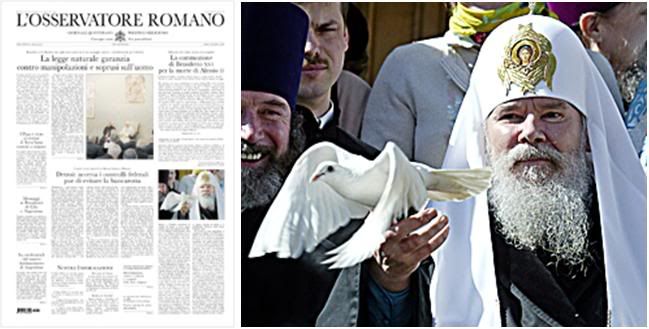 Defender of human and evangelical values:
Defender of human and evangelical values:
BENEDICT XVI'S EMOTION AT THE DEATH OF ALEXEI-II
OR published the text of the Holy Father's letter of condolence to the Holy Synod of the Russian Orthodox
Church [See earlier post above], as well as this news report from Moscow.
MOSCOW, Dec. 5 - The last public appearance of Alexei II, who died this morning at his residence outside
Moscow, in the village of Peredelkino, was Thursday evening, Dec. 4, when the Patriarch celebrated Mass
at the Kremlin.
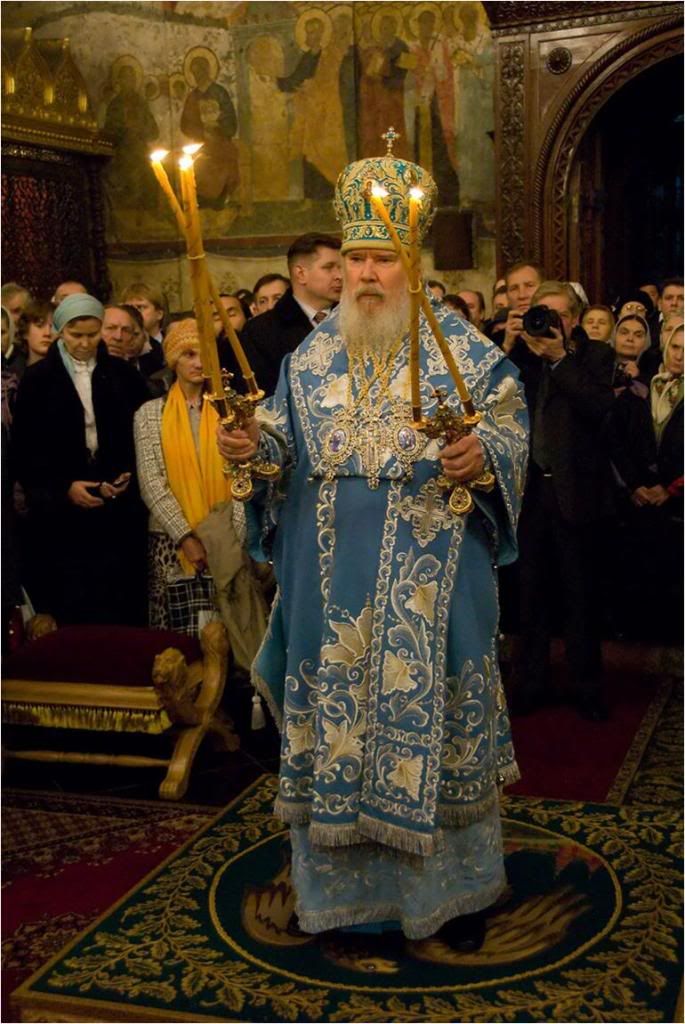 The Patriarch at the Kremlin Mass the eve of his death. Photo from the site of the Moscow Patriarchate, which also has
The Patriarch at the Kremlin Mass the eve of his death. Photo from the site of the Moscow Patriarchate, which also has
pictures from a December 2 rite that the Patriarch presided over at his cathedral in Moscow.
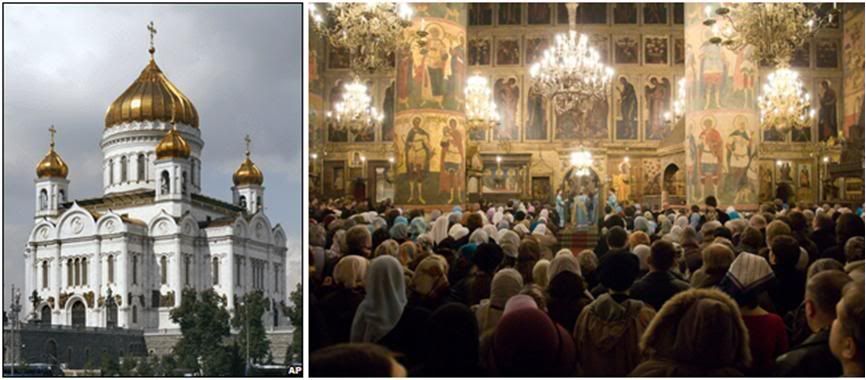
The Patriarch will most likely lie in state at the Cathedral of Christ the Savior in Moscow, a church that the Patriarch had ardently wished rebuilt after the fall of the Communist regime. It had been razed by Stalin in the 1930s.
Early reports indicated the funeral would be held December 7 in Moscow. This will be finalized by the Holy Synod which was convoked as soon as the death of the patriarch was known. The Synod begins meeting in Moscow tomorrow to decide an interim leader for the Russian Church. A permanent leader is to be elected within six months.
Alexei Mikahilovich Rediger was born on February 22, 1929, in Tallinn Estonia, where his father, a priest, had emigrated from St. Petersburg. In 1949, he returned to what had been renamed Leningrad to enter the seminary, where he completed his theology studies at the university level. He was ordained a priest in 1950.
Back in Estonia, he became a monk in 1961, an obligatory stage in order to pursue an ecclesiastical career in the Russian Orthodox Church. In the same year, he became Bishop of Tallinn and Estonia.
he joined the Holy Synod in 1964, and in 1968, he became a Metropolitan (bishop). From 1980 to 1990, he was the Bishop of Leningrad (now St. Petersburg again) and Novgorod, and on June 7, 1990, he was acclaimed Patriarch of Moscow and All the Russias. He was formally installed on June 10, becoming the 15h Patriarch of the Russian Orthodox Church.
Recently, occasions for dialog between the Patriarch and Pope Benedict XVI had intensified. In March 2006, Benedict XVI sent Alexei II messages both on his birthday and on his name day. The Patriarch sent back a reply through Cardinal Roger Etchegaray, along with a pectoral cross as a gift.
In January 2008, Alexei-II proposed a common pastoral plan with the Catholic Church. Last May. Benedict XVI sent the Patriarch a letter through Cardinal Walter Kasper, expressing the wish for a speedy path towards full communion among the Christian churches.
Last October, the Pope sent another letter through Cardinal Crescenzio Sepe, Archbishop of Naples, expressing the hope that the two Churches could bear witness together for peace. The Patriarch replied underscoring the positive development of relations and cooperation between the Catholic Church and the patriarchate.
Last October 26, the Archbishop of Paris, Andre Vingt-Trois, visited Moscow at the Patriarch's invitation to join in homage to the Orthodox martyrs of the Soviet era.
Earlier yesterday, the Apostolic Nuncio to Moscow, Mons. Antonio Mennini, and Archbishop Pietro Pezzi, said that a funeral Mass for the Patriarch would be offered at the Catholic Cathedral of the Mother of God in Moscow on Sunday.
Russian Catholics mourn
the death of the Patriarch

Moscow, December 5 (Interfax) - Russian Catholics pray for the soul of Patriarch of Moscow and All Russia Alexy II.
"Russian Catholics jointly with their Orthodox brethren are sorry about the enormous loss befalling them and pray for eternal peace for Patriarch of Moscow and All Russia Alexy II and hope that Christ will lay at rest the soul of His servant of many years in eternal light of His Kingdom," Joseph Werth, the chairman of the Conference of Catholic Bishops of Russia, said.
"Alexy II wisely cared for many millions of Russian Orthodox Church believers in this fateful and complicated period of changes for the Church, the State and the whole of the Russian people and then worked unceasingly to reconstruct the ecclesiastical unity damaged in the period of civil and church unrest," he added.
The Catholic Archbishop for Moscow Paolo Pezzi said Catholics will remember that "the Patriarch was always ready for Orthodox-Catholic dialog even in the most difficult years of mutual misunderstanding and separation."
"Jointly with the Catholic community of Russia, I hope that God will lay to rest the soul of His faithful servant Patriarch of Moscow and All Russia Alexy II in His Kingdom," Pezzi said.
 has a description of the Orthodox funeral liturgy on
www.newliturgicalmovement.org/#8050764080853016902
has a description of the Orthodox funeral liturgy on
www.newliturgicalmovement.org/#8050764080853016902
[Modificato da TERESA BENEDETTA 06/12/2008 12:59] |
 06/12/2008 12:00 06/12/2008 12:00 |
|
| | | OFFLINE | | Post: 15.896 | Registrato il: 28/08/2005
| Utente Gold | |
|

OR today.
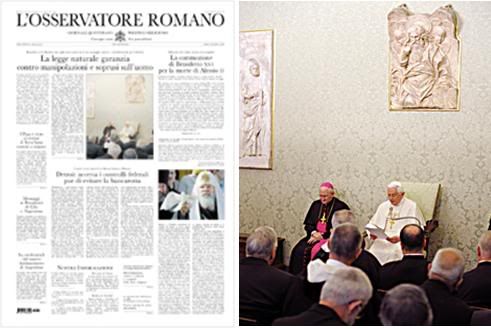
Benedict XVI to International Theological Commission:
'Natural law a guarantee against manipulation and exploitation of man'
Other Page 1 stories: Tribute to Patriarch Alexei II (see previous post); Pope expresses
nearness to Middle East Christians; he receives the new ambassador from Argentina; and
Detroit automakers accept federal controls to avoid declaring bankruptcy.
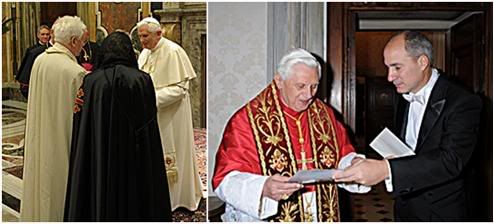 THE POPE'S DAY
THE POPE'S DAY
The Holy Father met today with
- Cardinal Giovanni Battista Re, Prefect of the Congregation for Bishops (weekly meeting).
- Cardinal Walter Kasper, President of the Pontifical Council for Promoting Christian Unity.
(He will likely head the Vatican delegation to Patriarch Alexei's funeral).
- Mons. Angelo Amato, Prefect of the Congregation for the Causes of Sainthood.
- Prof. Mario Agnes, immediate past editor of L'Osservatore Romano, now a Gentleman of His Holiness.
The Holy Father today named the Vatican delegation to the funeral of Patriarch Alexei II on Tuesday in Moscow:
- Cardinal Walter Kasper, President of the Pontifical Council for Promoting Christian Unity
- Cardinal Roger Etchegaray, emeritus president of the Pontifical Council for Justice and Peace
and the Pontifical Council Cor Unum
- Mons. Antonio Mennini, Apostolic Nuncio to the Russian Federation
- Rev. Fr. Milan Žust, S.J., offficial of the Pontifical Council for Promoting Christian Unity
- Mons. Ante Jozić, Secretary of the Nunciature in Moscow.
Photos from the official site of the Moscow Patriarchate
 show the remains of Alexei-II at the Peredelkino residence where he died Friday, and later, at Christ the Savior Cathedral
show the remains of Alexei-II at the Peredelkino residence where he died Friday, and later, at Christ the Savior Cathedral
where he is lying in state till the funeral on Tuesday, Dec. 9.
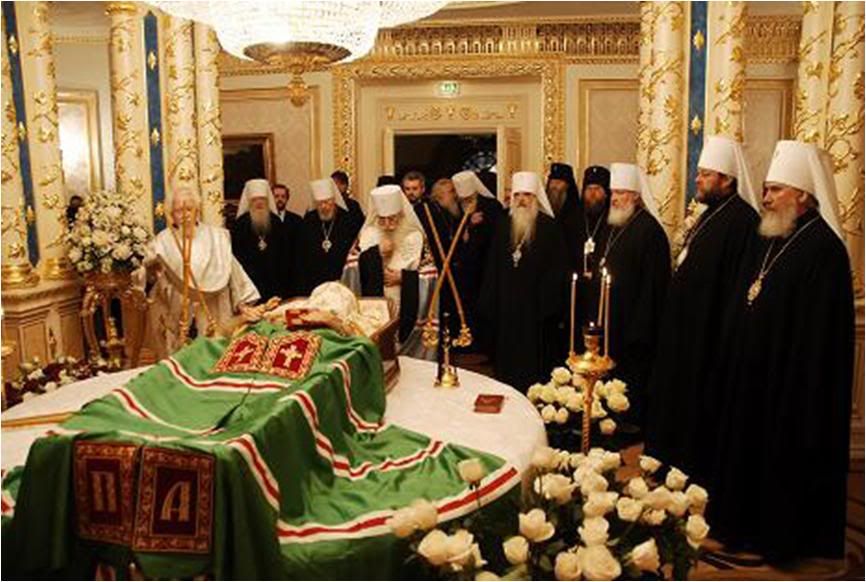
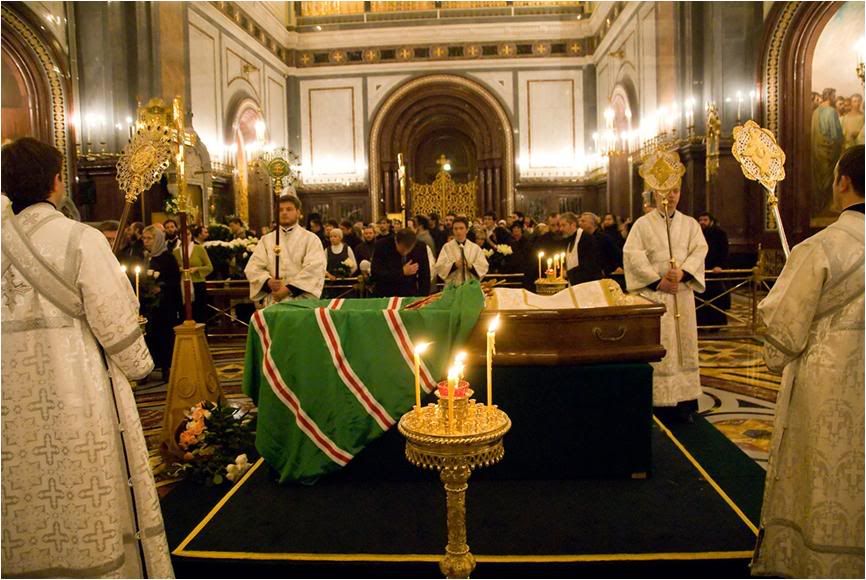
[Modificato da TERESA BENEDETTA 07/12/2008 17:56] |
 06/12/2008 12:44 06/12/2008 12:44 |
|
| | | OFFLINE | | Post: 15.897 | Registrato il: 28/08/2005
| Utente Gold | |
|
Taiwan's archbishop to invite
Pontiff to visit

Taipei, Dec. 6 (dpa) - The Archbishop of the Taipei Archdiocese will invite Pope Benedict XVI to visit Taiwan next year, a newspaper said on Saturday.
According to the Taipei Times, Archbishop John Hung is leading a delegation to the Vatican to report for the first time to the Pope on the state of Taiwan's dioceses [ad-limina visit], and invite the Pontiff to the island.
The invitation seeks his attendance at next year's celebrations of the 150th anniversary of the establishment of the Catholic Church in Taiwan.
The Vatican trip marks the first time Taiwanese bishops will report to Benedict XVI, who became Pope in 2005. The bishops met late Pope John Paul II in 2002.
If the Pope cannot come to Taiwan, a special envoy from the Vatican is expected to attend the celebrations next year, the paper quoted Hung as saying.
The eight-member delegation includes bishops and auxiliary bishops. They plan to stay in Rome until December 15.
The delegation will also report on the dioceses' exchanges with Chinese churches, including donations of books.
The policies of the Roman Catholic Church require diocesan bishops to visit the Pope and report on the state of their dioceses every five years.
To celebrate the 150th anniversary, Taiwan's bishops and parish priests hope to baptize 15,000 people next year.
In an interview with the Central News Agency this week, Hung said he was not sure if the Pope could visit Taiwan in 2009 because of a previously scheduled trip to the Philippines to attend the Asia Catholic Youth Festival. [But this has not been reported nor even rumored anywhere!]
The Catholic Church was established in Taiwan in 1859 when three Spanish Dominican priests from the Philippines and five Chinese missionaries arrived in Kaohsiung and built Taiwan's first Catholic church. Catholicism first arrived in the 17th century when Taiwan was occupied by the Spanish.
Peter Liu, bishop of the Kaohsiung diocese, said the number of Catholic followers in Taiwan has reached about 300,000 and there are 724 Catholic churches, 682 priests and 1,052 nuns in Taiwan, the Taipei Times said.
The Vatican has been trying to improve ties with China so that it can take better care of the 12 million Catholics in China. A papal visit to Taiwan would likely strain those relations.
The Vatican moved its embassy from China to Taiwan in 1957 after the founding of the atheist People's Republic of China in 1949.
But in recent years, the Vatican has been working to normalize relations with Beijing, which demands that the Holy See cut ties with Taiwan and stop interfering in China's religious affairs.
A Vatican official said that if China agrees to resume ties with the Vatican, the Church will move its embassy from Taipei to Beijing immediately.
In that event, it is not clear how the Vatican would handle its ties with Taipei, because the Church does not have a precedent for taking the initiative to sever diplomatic ties.
|
 07/12/2008 13:25 07/12/2008 13:25 |
|
| | | OFFLINE | | Post: 15.902 | Registrato il: 28/08/2005
| Utente Gold | |
|

OR today.
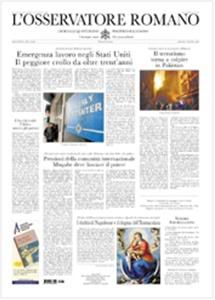 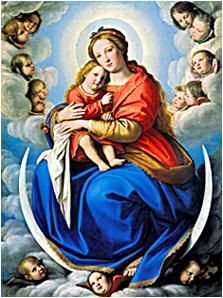
No papal stories in this issue. Page 1 stories are about the 530,000 job loss
in the United States for November; a terrorist attack in Pakistan kills 29;
central banks of 29 African nations see greater poverty in 2009 because of
greatly reduced export revenues; international pressure on Zimbabwe President
Mugabe to resign - his country unable to stop a cholera epidemic that threatens
neighboring countries, and inflation an unheard of 230,000,000 percent;
an essay on how the dogma of the Immaculate Conception upholds Catholic
doctrine that a person 'is', from the moment of conception.
THE POPE'S DAY
Angelus today.
[Modificato da TERESA BENEDETTA 07/12/2008 14:25] |
 07/12/2008 14:25 07/12/2008 14:25 |
|
| | | OFFLINE | | Post: 15.904 | Registrato il: 28/08/2005
| Utente Gold | |
|
 ANGELUS TODAY
ANGELUS TODAY
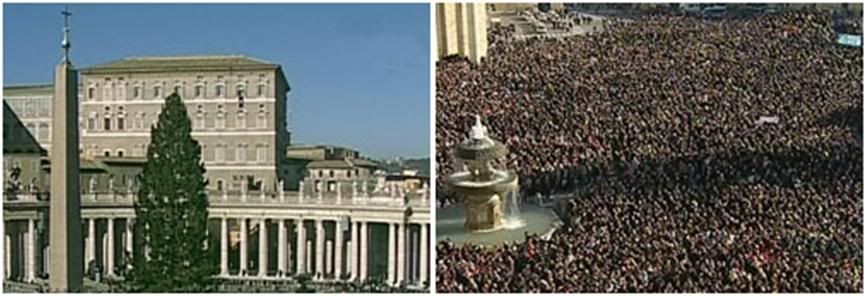
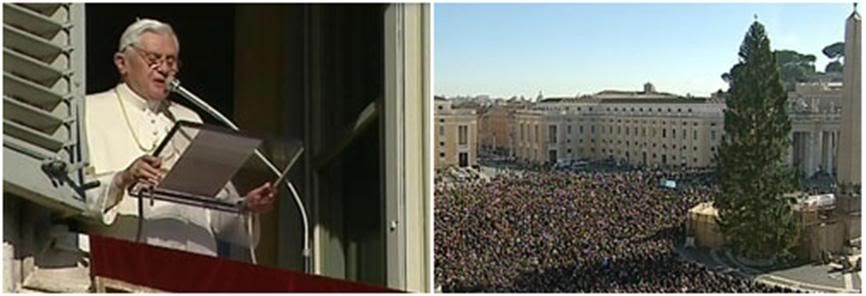
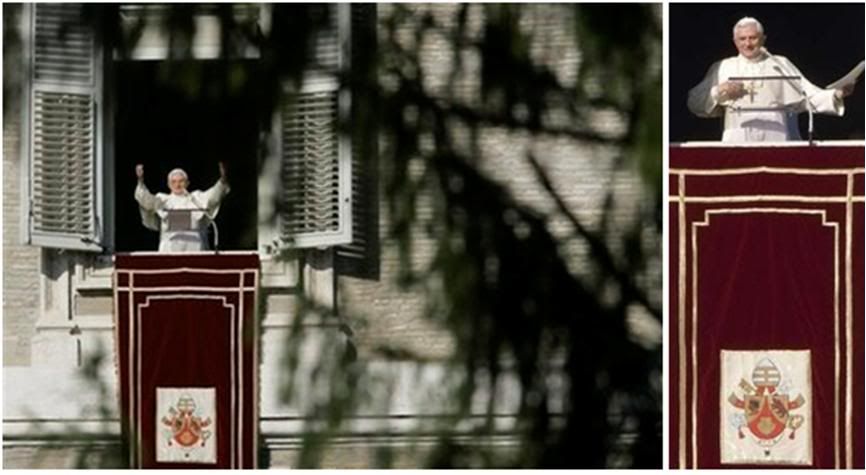
In his mini-homily, the Holy Father spoke on the words of Isaiah and John the Baptist preparing the way for Christ. In this respect, he said, the Church speaks for all the poor and the hungry in the world, the refugees and "all those who suffer grave and systematic violations of their rights".
After the Angelus, he asked for prayers for the late Patriarch Alexei II of Moscow.
He also announced his annual meeting with Rome university students on Thursday, Dec. 11, at which he will ideally consign to them St. Paul's Letter to the Romans.
Here is what he said in English:
I greet the English-speaking visitors and pilgrims who are gathered here today.
The Church puts before us, on this second Sunday of Advent, the figure of John the Baptist, the voice crying in the wilderness: "Prepare a way for the Lord". During this Advent season, as we wait in joyful hope for the coming of Christ, let us prepare a place for him in our hearts.
I invoke God’s abundant blessings upon all of you, and upon your families and loved ones at home.
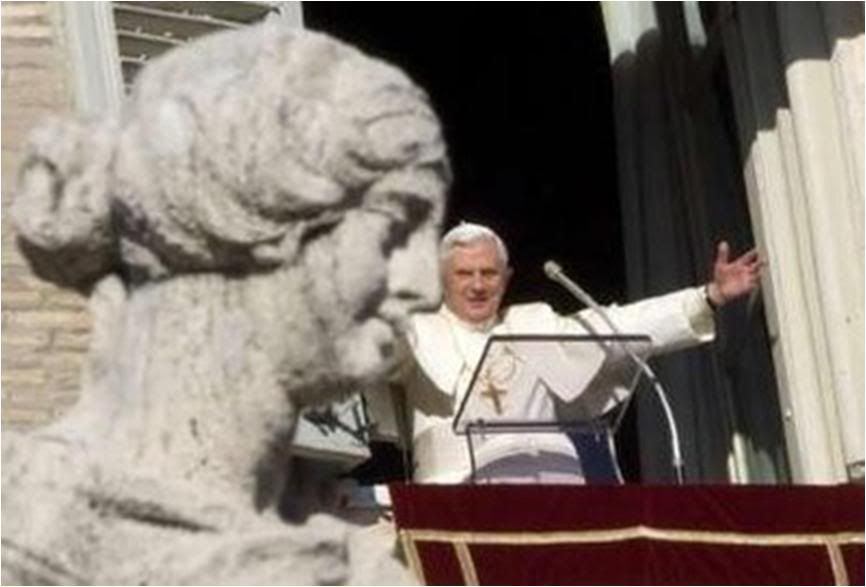 Here is a translation of the Holy Father's messages today
Here is a translation of the Holy Father's messages today:
Dear brothers and sisters!
For a week now, we have been living the liturgical time of Advent - a time of opening to the future of God, a time of preparing for the Holy Nativity, when he, the Lord - the absolute novelty - came to live in the midst of decadent mankind to renew it from within.
The liturgy of Advent resonates with a message full of hope, which invites us to raise our eyes to the ultimate horizon, but at the same time, to recognize in the present the signs of God-with-us.
In this second Sunday of Advent, the Word of God takes on the moving words of the so-called Second Isaiah, who announced liberation to the Israelites after decades of their exile in Babylonia: "Comfort, give comfort to my people, says your God. Speak tenderly to Jerusalem, and proclaim to her that her service is at an end" (Is 40,1-2).
This is what the Lord wants to do in Advent: to speak to the heart of his People, and through them, to all of mankind, in order to announce salvation.
Even today, the Church raises its voice: "In the desert prepare the way of the LORD!" (Is 40,3).
For the populations worn down by poverty and hunger, for the ranks of refugees, for all those who suffer grave and systematic violations of their rights - the Church makes herself the sentinel on the mountain of faith who announces: "Here is your God! Here comes with power the Lord GOD" (Is 40,11).
This prophetic announcement was realized in Jesus Christ. With his preaching and later with his death and resurrection, he brought to fulfillment the ancient promises, revealing a more profound and universal perspective.
He inaugurated an exodus that is not only earthly and historical - and therefore provisional - but that is radical and definitive: the passage from the kingdom of evil to the Kingdom of God, from the dominion of evil and death to that of love and life.
Therefore, Christian hope goes beyond the legitimate expectation of social and political liberation, because what Jesus initiated was a new humanity, which comes 'from God', but at the same time sprouts here on earth, to the degree in which it allows itself to be made fruitful by the Spirit of the Lord.
But this implies entering fully into the logic of faith: to believe in God, in his plan of salvation, and at the same time, to be committed to the construction of his Kingdom.
Justice and peace, in fact, are a gift of God, but they require men and women who are the 'good earth', ready to welcome the good seed of his Word.
The first fruit of the new humanity was Jesus, Son of God and son of Mary. She, the Virgin Mother, was the 'way' that the Lord himself prepared for his coming into the world.
With all her humility, Mary walks at the head of the New Israel in the exodus from every exile, from every oppression, from every moral and material slavery, towards "new heavens and a new earth in which righteousness dwells" (2 Pt 3,13).
To her maternal intercession, let us entrust this hope of peace and salvation for the men of our time.
After the prayers, he said:
In the past week, the Patriarch of Moscow and all the Russias, His Holiness Alexei-II, passed away. We join our Orthodox brothers in prayer to commend his soul to the goodness of the Lord so that he may welcome him to his Kingdom of light and peace.
Next Thursday afternoon, Dec. 11, I will meet students of the Roman universities in St. Peter's Basilica, after Holy Mass which will be presided by Cardinal Agostino Vallini.
On the occasion of the Pauline Year, I will hand to the young students the Letter to the Romans by the Apostle Paul, and it will be my pleasure to greet them, along with the rectors, professors, and technical and administrative staff of the universities of Rome, in this traditional encounter preparatory to the Holy Nativity.
It is also my pleasure to address a special greeting to the Chierici Mariani dell’Immacolata Concezione, who will start tomorrow the centenary jubilee of the rebirth and reformation of their Congregation.
Dear brothers, may the Virgin Mary obtain abundant graces for you and help you to remain faithful to your charism.
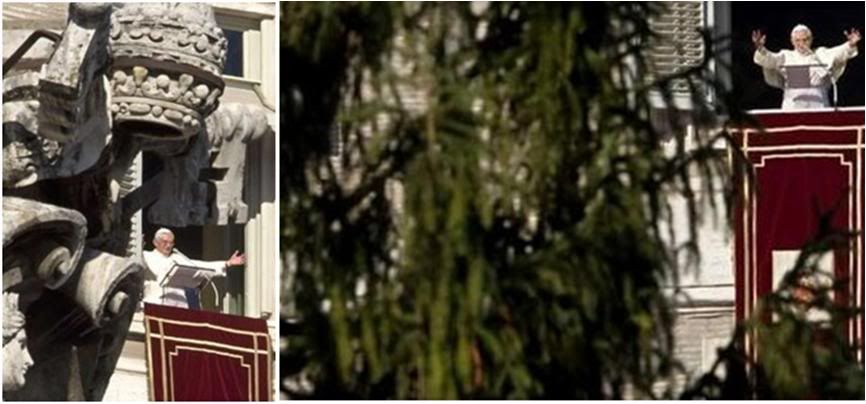
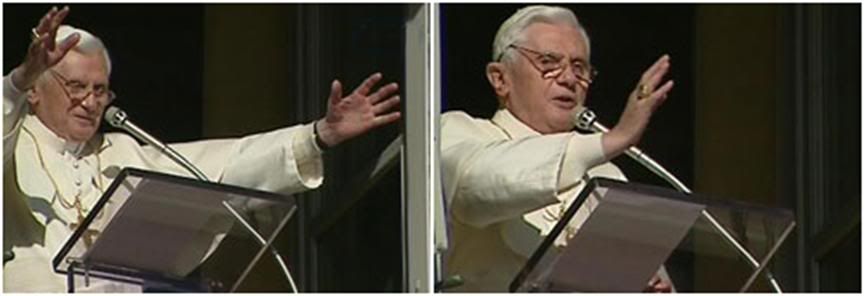
[Modificato da TERESA BENEDETTA 08/12/2008 02:46] |
 07/12/2008 19:22 07/12/2008 19:22 |
|
| | | OFFLINE | | Post: 15.908 | Registrato il: 28/08/2005
| Utente Gold | |
|
 This is the first Muslim reaction I have seen so far to Benedict XVI's recent re-statement that inter-religious dialog is primarily an inter-cultural dialog.
The concreteness of inter-religious dialog
This is the first Muslim reaction I have seen so far to Benedict XVI's recent re-statement that inter-religious dialog is primarily an inter-cultural dialog.
The concreteness of inter-religious dialog
Letter to the Editor
Translated from

December 6, 2008
The letter-preface of the Pope to Marcello Pera's book has kindled a more spirited debate than might have been thought.
In fact, the words of the Pope have raised some perplexity, especially since we ourselves have recommended against exploiting a statement like "Inter-religious dialog in the strict sense of the word is not possible". [So, wherein lies the perplexity?]
There are two principal points to which we wish to call attention. In the first place, the need to give more concreteness to inter-religious dialog. That concreteness which Mons. Angelo Amato, prefect of the Congregation for the Causes of Saints, has called the 'dialog of charity'.
There are many Muslims who underscore the need for intervening concretely on matters of urgent relevance, as for instance, education of the youth, the battle against fundamentalism, and the introduction of a culture of ethics into civilian society.
Not by chance, on the occasion of the (seminar held by) the Catholic-Muslim Forum in Rome last November 4-6, we proposed, as representatives of the Grand Mosque of Rome, the creation of a permanent inter-religious committee to promote common values, in order to project the spiritual and ethical voice of religions even in the most difficult situations today.
In the second place, religions are more than simple ideologies or social movements. [The Catholic Church has always made that clear - since God did not come to earth to promote political or social causes but a spiritual rebirth of mankind.]
Jews, Christians and Muslims share faith in the same one God and the legacy of the prophets, starting with Abraham, our common patriarch. It is on the centrality of faith in God that a large part of the relationship of religions with the contemporary world is played.
The Pope himself, addressing the delegates to that seminar, said that "we can and should be worshippers of the one God".
Cardinal Jean-Louis Tauran acknowledged a fundamental merit in the dialog with Islam: If God is returning to European societies, he said recently (according to a report in the 11/28/08 issue of L'Osservatore Romano), it is "thanks to the Muslims - who have become a significant minority in Europe and who want room for God in society". [Translated on this thread the day it came out in OR.]
We think, therefore, that the dialog of cultures should unite with that of spirituality*, and that the relationship between religions could be inspired by episodes like the encounter between Francis of Assisi and the Egyptian Sultan Malik al-Kamil.
Few may know that the latter was not just any sovereign, but a follower of the great mystic master Muhyddin Ibn Arabi. If one also considers that the physician and great confidant of that Sultan was Maimonides - who is possibly the greatest rabbi of all time - then one can have an idea why a saint like Francis pushed on towards the Egyptian city of Damietta which was under siege, so far from his way to Jerusalem.
Not to forget that a few years later, following the example of Francis, Emperor Frederick II came to an agreement with the Sultan, restoring peace to the Holy Land.
Today, it is the principal components of the Islamic world which are committed to dialog as shown by the recent meetings held in Mecca, Madrid, Rome and the United Nations - a positive dialog not only with Christianity but also with Judaism as some authoritative representatives of the Jewish community pointed out in a recent letter to your newspaper.
SIGNED:
Abdallah Redouane, Secretary-General of the Grand Mosque of Rome
Mario Scialoia, Counselor to the Islamic Cultural Center of Italy
Karim Mezran and Ahmad Gianpiero Vincenzo , President and
Secretary-General of the Association of Italian Muslim Intellectuals
* * * * * * * * * * * * * * * * * * * * * * * * * * * * * * * * * * * * * * * * * * * * * * * * * * * * * * * * * * * * *
*Nothing in what the Holy Father said rules out that spirituality can be discussed in inter-religious dialog. In the letter to Pera and in previous statements, he refers explicitly to theological discussion, which involves the doctrine that distinguishes each religion, and which by its nature would not lead to any convergence of thought. It may lead to each side learning more about the other and thinking more about a different religious doctrine, but this remains an abstraction and not a concrete dialog of works.
St. Francis and the Sultan, from the Life of St. Francis, Frescoes attributed to Giotto,
late 13th century, Basilica of St. Francis, Assisi.
In citing the episode of St. Francis with the Sultan of Egypt, it might be instructive to see how the episode is reported by G.K. Chesterton and Paul Sabatier in their biographies of Francis:
Francis challenged the Muslim scholars to a test of true religion by fire; but they retreated. When Francis proposed to enter the fire first, under the condition that if he left the fire unharmed, the sultan would have to recognize Christ as the true God, the sultan was so impressed that he allowed Francis to preach to his subjects.
Though Francis did not succeed in converting the sultan, the last words of the sultan to Francis of Assisi were, according to Jacques de Vitry, bishop of Acre, in his book "Historia occidentalis, De Ordine et praedicatione Fratrum Minorum (1221)": “Pray for me that God may deign to reveal to me that law and faith which is most pleasing to him.”
As for the last statement, referring to King Abdullah's initiatives for inter-religious dialog, what the Muslim writers do not say, of course, is that the initiative has so far completely ignored that great test of sincerity in inter-religious dialog - namely, respect for the right to religious choise (or non-choice) and expression. In the same way that the issue was skirted by the Muslim representatives at the Forum seminar held in the Vatican.
What can be more concrete and less abstract than respect and recognition of that right for non-Muslims, which most of the Muslim states, starting with King Abdullah's own country, have long denied?
[Modificato da TERESA BENEDETTA 07/12/2008 19:48] |
 08/12/2008 02:22 08/12/2008 02:22 |
|
| | | OFFLINE | | Post: 15.913 | Registrato il: 28/08/2005
| Utente Gold | |
|

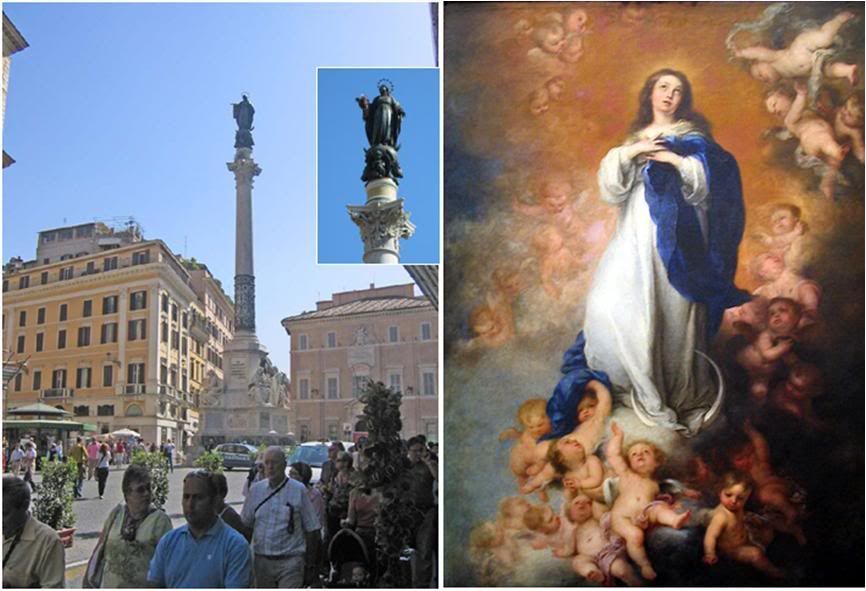 The Colonna dell'Immacolata at Piazza Spagna; and the Immaculate Conception painted by Spanish painter Murillo (1678).
THE POPE PAYS HOMAGE TODAY
The Colonna dell'Immacolata at Piazza Spagna; and the Immaculate Conception painted by Spanish painter Murillo (1678).
THE POPE PAYS HOMAGE TODAY
TO THE 'IMMACOLATA' IN PIAZZA SPAGNA
The Holy Father's public day on the Feast of the Immaculate Conception will begin with a holiday Angelus from his study window at noon and end with the now-traditional Pope's homage to the Immaculate Conception whose image crowns a pillar in Piazza Spagna, in Rome's tourist center.
Last year, he proceeded to the Basilica of Santa Maria Maggiore afterwards to venerate the image of Mary as Salus Populi Romani and to mark the start of the 150th year Jubilee of the Marian apparitions in Lourdes.
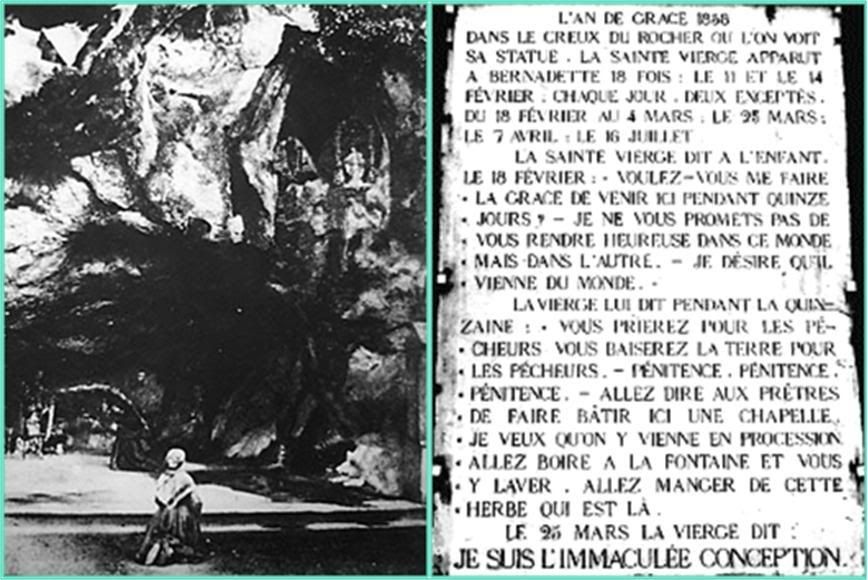 In her apparition on March 25, Bernadette Soubirous's 'lady in white' identified herself as 'the Immaculate Conception'.
In her apparition on March 25, Bernadette Soubirous's 'lady in white' identified herself as 'the Immaculate Conception'.
It has not been announced whether he will do the same this year, but Cardinal Tarcisio Bertone will celebrate the concluding Mass for the Lourdes Jubilee at Santa Maria Maggiore tomorrow, at which special guests will be the members of UNITALSI, the Italian association that organizes pilgrimages of sick people to Lourdes and other shrines.

In Lourdes, the Jubilee Year will formally end tomorrow morning with an International Mass to be presided over by Cardinal Severino Poletto, Archbishop of Turin.
The Italian service of

reports on the relation between the People of God and the Immaculate Conception.
Fabio Colagrande spoke with Fr. Salvatore, Perella, professor of Mariology at the Marianum of Rome:
FR. PERELLA: The faithful have always considered the Immaculate Conception to be a great truth. It seemed impossible to them in early times, and even now, that the Mother of God could have been contaminated with sin, not even Original Sin, which was not committed by any man after Adam and Eve but which is transmitted to everyone.
What the faithful believe, out of faith illumined by the Holy Spirit - that which is called 'baptismal intuition' - also has a theological dimension. And throughout history, there were debates among theologians on whether Mary herself needed forgiveness and redemption. Some claimed she earned immunity only after she conceived Jesus.
And how did this debate turn out?
The Franciscan monk Duns Scotus (1265-1308) began a new argument thus: "Who is Christ? He is the Redeemer and mediator, a perfect being". As such, he argued, the creature who was to be the means for his incarnation was pre-ordained by God to be preserved from original sin. Earlier saints and Popes had their doubts. But the festivity came to be celebrated in liturgy as it was in popular piety.
Finally, it was Pius IX, who was convinced it was his papal responsibility to do so, undertook a survey among his bishops on the question, and on December 8, proclaimed the dogma that "the most Blessed Virgin Mary, in the very first moments of her Conception, through the singular grace of Almighty God, and through the foresight of the merits of Christ Jesus, Saviour of the human race, was preserved immune from all stains of original sin." That Christ had realized in Mary - in advance, so to speak - the redemption that happens to us through Baptism.
What does the dogma of the Immaculate Conception say to men today?
It also represents the triumph of God's love for man, and a sign that God truly does great things. It restores to man, in the creature Mary, his original beauty which was disfigured by original sin.
That is why, what we might call the aesthetic dimension of the Immaculate Conception implies the dignity of every man, the dignity of women, the dignity of human life, the beauty and power of the creature redeemed by Jesus.
If Christ is the Son of the Father, the imprint and image of his substance, if Christ is the most beautiful in all creation, he 'transmitted' the beauty of holiness in an extraordinary way to his mother from the very first instant of her conception.
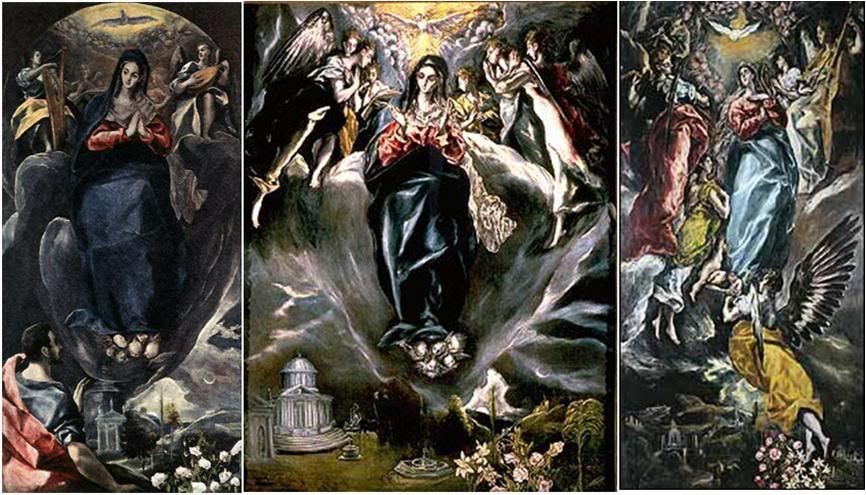 The Immaculate Conception, painted by El Greco: The first and third, painted in 1585 (left) and in 1610 (right), respectively, are found at the Museo de la Santa Cruz, in Toledo (the 1585 painting shows St. John); and the second (center), painted 1607-1613, is part of the Thyssen-Bornemisza collection in Madrid.
The Immaculate Conception, painted by El Greco: The first and third, painted in 1585 (left) and in 1610 (right), respectively, are found at the Museo de la Santa Cruz, in Toledo (the 1585 painting shows St. John); and the second (center), painted 1607-1613, is part of the Thyssen-Bornemisza collection in Madrid.
Pius IX's proclamation of the dogma of the Immaculate Conception reads in part:
To the honour of the holy and undivided Trinity, to the worthiness and splendid beauty of the Virgin Mother of God, to the upholding of the Catholic faith, and to the furthering of the Christian religion, with the authority of Our Lord Jesus Christ, with that of the holy Apostles Peter and Paul, and with Our own authority, we declare, we pronounce and we define the doctrine which holds that the most Blessed Virgin Mary, in the very first moments of her Conception, through the singular grace of Almighty God, and through the foresight of the merits of Christ Jesus, Saviour of the human race, was preserved immune from all stains of original sin.
And the opening Prayer of the Mass of the Solemnity of the Immaculate Conception reads:
Father, you prepared the Virgin Mary to be the worthy Mother of your Son. You let her share beforehand in the salvation Christ would bring by his death, and kept her sinless from the first moment of her conception. Help us by her prayers to live in your presence without sin.
[Modificato da TERESA BENEDETTA 08/12/2008 03:54] |
 08/12/2008 16:59 08/12/2008 16:59 |
|
| | | OFFLINE | Post: 3.464 | Registrato il: 23/11/2005
| Utente Master | |
|
Okay, this is kind of long but Spengler always has interesting, intelligent things to say.
Benedict XVI is magnificently right
By Spengler
Asia Times
December 9, 2008
"President Roosevelt is magnificently right," John Maynard Keynes wrote of president Franklin Delano Roosevelt's decision to devalue the American dollar in 1933. If any economic policy stance deserves such praise today, it is that of Pope Benedict XVI, whose views on ethics and economics occasioned a flurry of comment last month. Italy's Finance Minister Giulio Tremonti observed, "The prediction that an undisciplined economy would collapse by its own rules can be found" in a 1985 paper (see Market Economy and Ethics, Acton Institute) by then Cardinal Joseph Ratzinger, which Tremonti called "prophetic". I don't know whether it was prophetic, but the future pope was right, and magnificently so.
An unethical economy, he argued, will destroy itself, and economics cannot determine whether any activity is ethical or not. Internet stock valuations, the market delusion of a decade ago, presumed that pornography, gaming, music downloads and shopping would be the driving forces of the future economy. It is easy to ridicule this Alice-in-Wonderland accounting after the fact, just as it is easy to laugh at television advertisements that even today urge Americans to buy homes because their prices double every 10 years. But what should we say of an economy based on consuming as much as one can without troubling to bring children into the world?
Here is what then Cardinal Ratzinger said about it more than 20 years ago:
It is becoming an increasingly obvious fact of economic history that the development of economic systems which concentrate on the common good depends on a determinate ethical system, which in turn can be born and sustained only by strong religious convictions. Conversely, it has also become obvious that the decline of such discipline can actually cause the laws of the market to collapse. An economic policy that is ordered not only to the good of the group - indeed, not only to the common good of a determinate state - but to the common good of the family of man demands a maximum of ethical discipline and thus a maximum of religious strength.
What caused the laws of the market to collapse in 2008? In another location (see The monster and the sausages, Asia Times Online, May 20, 2008), I argued that the bulge of workers in the US and Europe approaching retirement age is the ultimate cause of the financial crisis. Too much capital chased too few investment opportunities, and the financial industry met the demand by selling sow's ears with the credit rating of silk purses.
Underlying the crisis is the Western world's repudiation of life, through a hedonism that puts consumption or "self-realization" ahead of child-rearing. The developed world is shifting from a demographic profile in which the very young (children four years and under) outnumbered the elderly (65 and older), to a profile with 10 times as many retirees as children aged four or younger. Economics simply never has had to confront a situation in which the next generation simply failed to turn up.
It is not just the professionals who were ethically challenged. Bankers who insisted on dancing until the music stopped, as Citigroup's former chairman Chuck Prince wisecracked just before his 2007 dismissal, deserve the rage of the public. So do the analysts working for Moody's Investor Services who acknowledged in messages made public by Congressional investigators that "we sold our soul to the devil for revenue". The moral rot reaches into most of the families in the developed world.
In the cited paper, Cardinal Ratzinger picked a bone with the determinism of the "free market" economic model:
Following the tradition inaugurated by Adam Smith, this position holds that the market is incompatible with ethics because voluntary "moral" actions contradict market rules and drive the moralizing entrepreneur out of the game. For a long time, then, business ethics rang like hollow metal because the economy was held to work on efficiency and not on morality. The market's inner logic should free us precisely from the necessity of having to depend on the morality of its participants. The true play of market laws best guarantees progress and even distributive justice ...
This determinism, in which man is completely controlled by the binding laws of the market while believing he acts in freedom from them, includes yet another and perhaps even more astounding presupposition, namely, that the natural laws of the market are in essence good (if I may be permitted so to speak) and necessarily work for the good, whatever may be true of the morality of individuals.
There is something profoundly disingenuous about the pure free-market model, to which an even stronger objection might be raised, namely that it cannot possibly exist. The market does not spring into being like warriors from the dragon's teeth sown by Cadmus. Markets are part of society, and if society passes the demographic point of no return, the market will die along with all other social institutions.
There is an obvious, glaring flaw in the deterministic model: even if we assume that no one ever cheated, lied, or stole, the market can't determine who enters it and who leaves it. First of all, these depend on birth and death, and secondly on law and custom. For example: who is allowed to take deposits from the public, and make loans? In the pure free-market model, every deposit-taking bank would make loans in its own currency, and the public would value a JP Morgan dollar differently from a Bank of America dollar or a Citigroup dollar, not to mention a dollar from the late and unlamented Washington Mutual.
Until 1863, that is how American banks operated. The late Milton Friedman, a consistent if sometimes quixotic advocate of free markets, proposed a return to this chaos. If the public treasury guarantees bank deposits, he observed, the market no longer is free.
In Congressional testimony this autumn, former Federal Reserve chairman Alan Greenspan notoriously admitted that his free-market philosophy was inadequate. Yet nothing that occurred under Greenspan's tenure had to do with freedom. Banks that enjoyed a monopoly due to their federal charters were permitted to transfer assets away from their balance sheets to other entities, allowing them to use much less capital to support assets than in the past. Even worse, the Federal Reserve allowed larger and more sophisticated banks to put less capital against assets that bore a high rating from Moody's and Standard & Poor's - the agencies that later owned up to having sold their souls to the devil for revenues.
Greenspan, it turns out, presided over a bubble manufactured by the most-regulated private companies in the world, the large commercial banks, who operate with the implicit guarantee of the US Treasury. When the banks got into a hole, the Treasury guarantee became explicit, and floated the banks out of the whole with several trillions of dollars of actual and prospective taxpayer money. Private interests appropriate a small but noticeable fraction of America's wealth, emulating in a very small way the behavior of private interests in Argentina, which typically steal all the national wealth as well as whatever they can borrow from foreigners.
The future pope made two parallel points: first, that morality cannot be effective without competent economics, and secondly, that economics cannot dispense with morality by trusting to the supposedly automatic workings of the marketplace:
A morality that believes itself able to dispense with the technical knowledge of economic laws is not morality but moralizing. As such it is the antithesis of morality. A scientific approach that believes itself capable of managing without an ethos misunderstands the reality of man. Therefore it is not scientific. Today we need a maximum of specialized economic understanding, but also a maximum of ethos so that specialized economic understanding may enter the service of the right goals. Only in this way will its knowledge be both politically practicable and socially tolerable.
A clearer way to make these distinctions, perhaps, is to observe that the market mechanism has a negative but not a positive function. The market cannot decide what innovations or practices are beneficial to society. It can only punish incompetence and inefficiency. "Creative destruction", in the famous phrase of the Austrian economist Joseph Schumpeter, refers to Goethe's Mephistopheles, who tries to do evil but ends up doing good instead. Without the devilish work of destruction that kills off incompetence, established monopolies would choke off innovation.
Nothing in the market mechanism, however, can distinguish between pornography and art, medicine and recreational drugs, development and suburban sprawl, or, for that matter, family formation and addictive consumption. The modern marketplace arose during the 16th and 17th centuries through demand for silk, spices, rum and tobacco, and destroyed most of the population of South America and perhaps a third of the population of West Africa. In the process, the West learned to form joint-stock companies, write insurance, trade options, and establish central banks. All of these contributed mightily to its economic development later, despite their checkered origins. If moral rot has taken hold of a society, the market mechanism will take it to hell faster and more efficiently than any of the alternatives.
There is an even greater flaw in the theory of the free market, perhaps, and that is in the assertion that the market can form adequate expectations about the future profitability of firms and make proper judgments about allocation of capital. How do we explain away the misallocation of capital to Internet stocks during the late 1990s and to homes in the United States (and elsewhere) during the ensuing years?
The world simply is too uncertain for the market to look more than a year or two over the horizon. Technological and social change occurs in unexpected and dramatic ways, frustrating the best guesses of the cleverest entrepreneurs, not to mention the stodgy decisions of central planners. The market cannot form accurate long-term expectations; at best it can imagine future outcomes. The quality of its imagination in this case depends on cultural factors that transcend economic judgment.
Americans spent the 1990s in a fantasy world, where technological change supposedly would transform the human condition, taking as their intellectual guide science-fiction writers like William Gibson. There was nothing wrong with the market mechanism as such; what went haywire was the childish imaginings of the American public.
The future pope's 1985 paper insists that it is mere moralizing, not morality, to dismiss what economics has learned about the market mechanism. But economics cannot find a remedy for the imagination of an evil heart, or a foolish one, for that matter. Ethics founded on religion are the precondition for long-term economic success, if for no other reason than economies depend on family formation. If the present economic crisis helps the West to reflect on its moral weakness, the cost well may be worth it.
|
 08/12/2008 23:20 08/12/2008 23:20 |
|
| | | OFFLINE | | Post: 15.914 | Registrato il: 28/08/2005
| Utente Gold | |
|

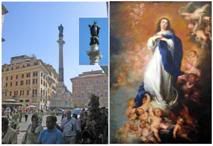
No OR today.
THE POPE'S DAY
Holiday Angelus- In a few brief sentences, the Holy Father explained beautifully why there is evil
in the world and why Mary was conceived without original sin. In French, he greeted the faithful in Lourdes
at the Closing Mass of the Jubilee Year, and the faithful at Ars, where they start celebrating the 150th
anniversary of the death of St. John Vianney.
Homage to the Immacolata - In his fourth annual visit to the Pillar of the Virgin at Piazza Spagna,
the Pope prayed for "all the families who cannot make ends meet, the unemployed, the immigrants,
disadvantaged youth and all those who are undergoing domestic difficulties".
I thought since I am starting my Forum day very late today that I would be able at least to report on the OR double issue for Monday-Tuesday,
except that Monday is also a holiday, so I suppose we won't see an OR until Wednesday.
[Modificato da TERESA BENEDETTA 08/12/2008 23:21] |
 09/12/2008 00:13 09/12/2008 00:13 |
|
| | | OFFLINE | | Post: 15.915 | Registrato il: 28/08/2005
| Utente Gold | |
|
 ANGELUS TODAY
ANGELUS TODAY
SOLEMNITY OF THE IMMACULATE CONCEPTION
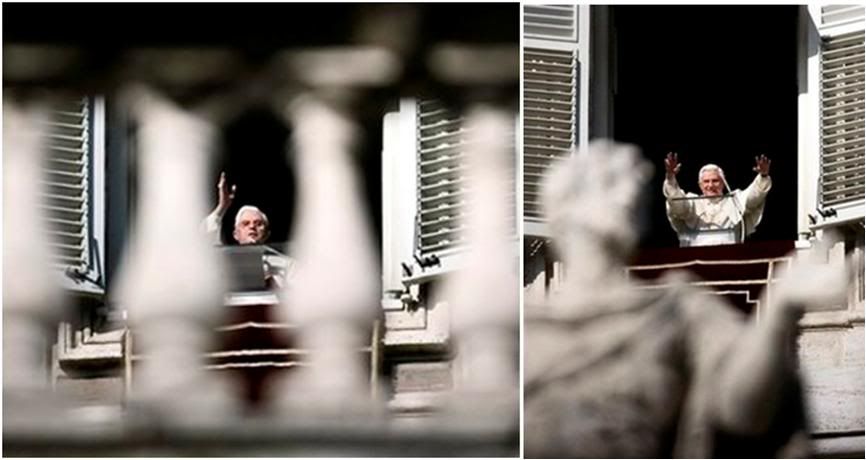 Here is a translation of the Holy Father's words at the noontime Angelus today:
Here is a translation of the Holy Father's words at the noontime Angelus today:
Dear brothers and sisters!
The mystery of the Immaculate Conception of Mary that we celebrate solemnly today reminds us of two fundamental truths of our faith: original sin, first of all; and then the victory over it, thanks to Christ, a victory which shines sublimely in the most Blessed Mary.
The existence of what the Church calls 'original sin' is unfortunately too crushingly evident if we look around us and, above all, within us.
The experience of evil is in fact so consistent as to impose itself and lead us to ask: Where does it come from? The question is even more profound for a believer: If God, who is absolute Good, created everything, then where does evil come from?
The first pages of the Bible (Gn 1-3) answer this fundamental question, which every generation raises, with the story of creation and of the fall of our first parents: God created everything, and in particular, he created the human being in his own image
He did not create death, but this came into the world through the devil's envy (cfr Wis 1,13-14; 2,23-24) who, having rebelled against God, drew even men towards deceit, leading them to rebellion.
It is the tragedy of freedom, which God accepted to the ultimate out of love, but promising that there would be a son of woman who would crush the head of the serpent (Gn 3,15).
From the beginning, then, 'the eternal counsel' - as Dante said - had a 'pre-ordained condition' (Paradise, XXXIII,3): the Woman predestined to be the mother of the Redeemer, mother of he who humbled himself to the extreme in order to lead us back to our original dignity.
This Woman, in the eyes of God, always had a face and a name: 'full of grace' (Lk 1,28) as the Angel called her, when he visited her in Nazareth. She is the new Eve, spouse of the new Adam, destined to be the mother of all the redeemed.
Thus St. Andrew of Crete wrote: "The Theotokos [God bearer] Mary, common refuge of all Christians, was the first to be freed from the original fall of our ancestors" (Homily IV on the Nativity, PG 97, 880a).
And the liturgy today affirms that God "prepared a worthy dwelling for his Son and, in advance of his death, preserved her from every stain of sin" (Collect Prayer).
Dearest ones, in Mary the Immaculate, we contemplate the reflection of the Beauty which saves the world: the beauty of God which shines on the face of Christ. In Mary, this beauty is totally pure, humble, free of any pride and presumption.
It was thus the Virgin showed herself to St. Bernadette 150 years ago at Lourdes, and thus she is venerated in so many shrines. This afternoon, following tradition, I too will render homage at the monument dedicated to her in {Piazza di Spagna.
Let us now invoke the Immaculate Virgin with confidence, repeating in the Angelus the words of the Gospel which the liturgy proposes for our meditation today.
After the prayers, he said:
It is my pleasure to greet the Pontifical Academy of the Immacolata and its president, Cardinal Andrea Maria Deskur.
Dear friends, 20 years since the approval of the Academy's new Statute, I invoke the Blessed Virgin so that she may always watch over you and your activities.
In French, he said:
I am happy to greet all the dear French-speaking people present for this Angelus prayer, here in Rome, or through radio and television.
On this Feast of the Immaculate Conception, we join the pilgrims gathered in all Marian shrines, most especially those in Lourdes for the closing of the Jubilee Year of the Apparitions; and those gathered in Ars for the opening of the Jubilee Year marking the 150th anniversary of the death of St. Jean-Marie Vianney.
May Our Lady of Advent help us to say Yes to the Lord who will fulfill our life. We can, following her example, live in trust. With my Apostolic Blessing!
In English, he said:
I greet all the English-speaking visitors and pilgrims who are present today.
The feast of the Immaculate Conception of the Blessed Virgin Mary is an occasion for us all to rejoice in the radiant purity of the Mother of our Redeemer.
She was chosen from among all women to be our pattern of holiness, a sign of favour to the Church at its beginning and the promise of its perfection as the spotless bride of Christ.
May God bless you, your families and all those you love.
 |
 09/12/2008 01:11 09/12/2008 01:11 |
|
| | | OFFLINE | | Post: 15.916 | Registrato il: 28/08/2005
| Utente Gold | |
|
 HOMAGE TO THE 'IMMACOLATA'
HOMAGE TO THE 'IMMACOLATA'
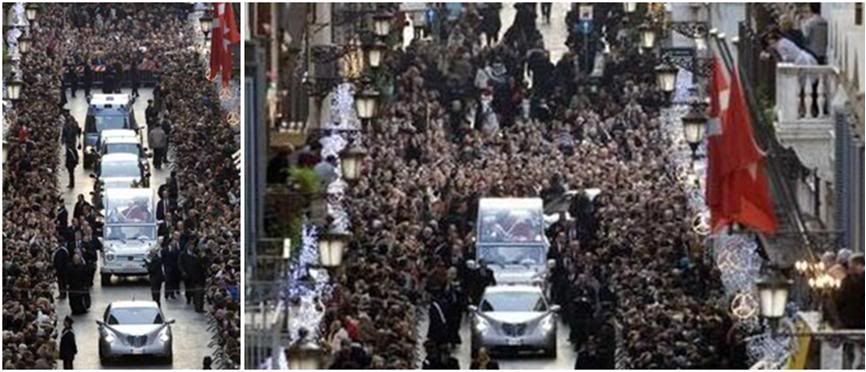
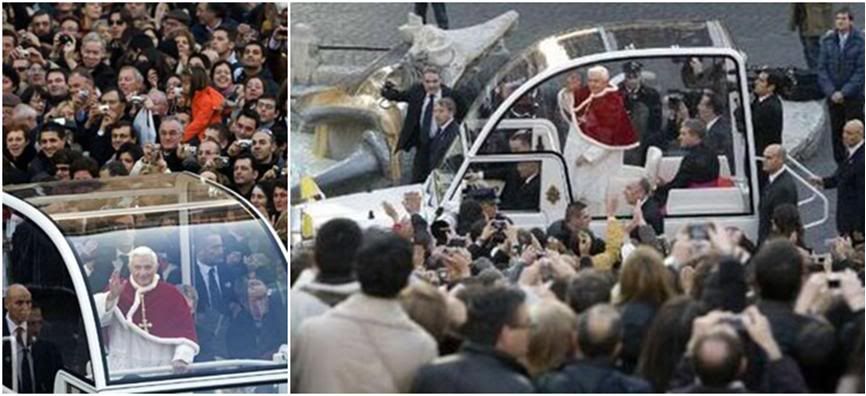
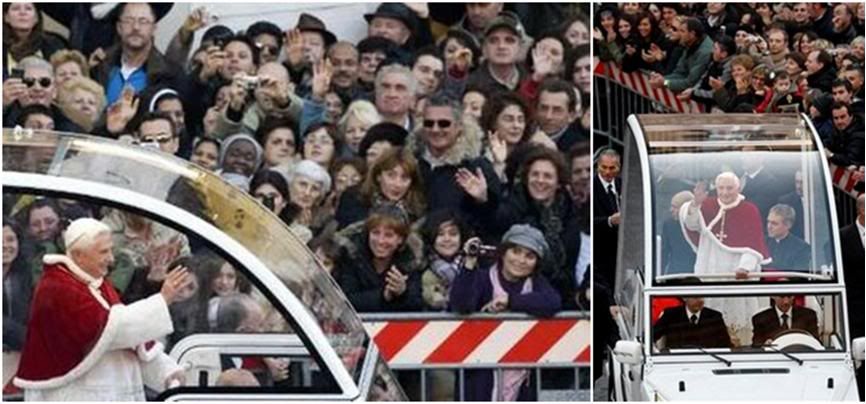
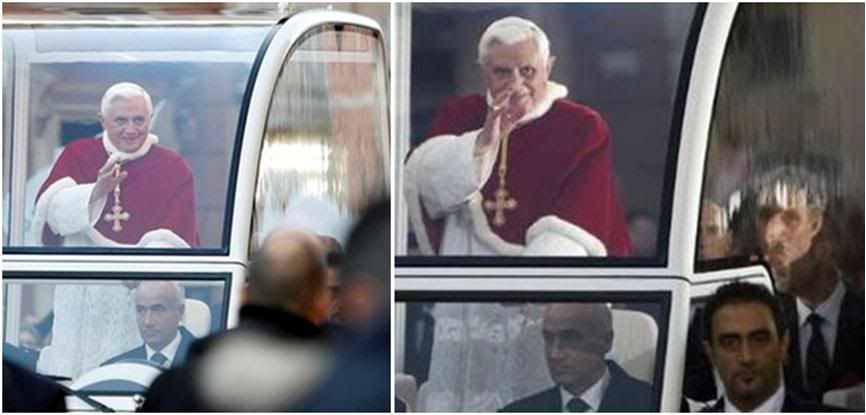
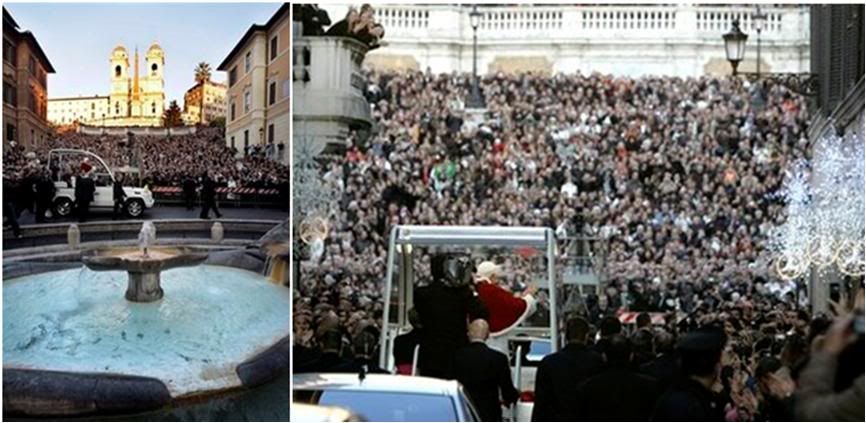
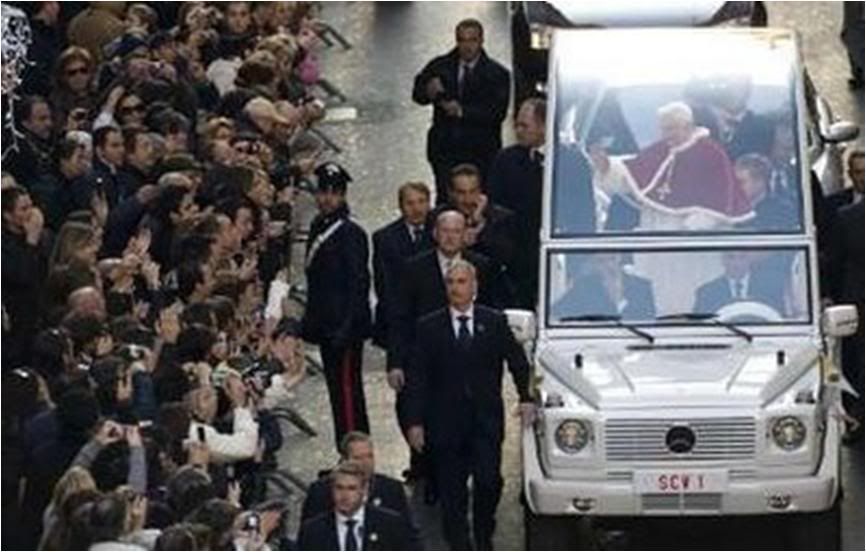
At 3:45 p.m. today, Solemnity of the Immaculate Conception of the Blessed Virgin Mary, the Holy Father Benedict XVI left the Vatican to go to Piazza di Spagna for the traditional act of veneration for the Immacolata.
Along the way, the Pope made a brief stop in front of the Church of Santissima Trinita for a greeting by the association of business in via Condotti [Rome's priciest shopping street, near the Spanish Steps], who traditionally present him with a gift chalice.
Upon arrival in Piazza Spagna, the Pope blessed a basket of roses which he laid at the foot of the Pillar of the Immacolata.
Here is a translation of the Pope's homily during the event, ending with a prayer:
Dear brothers and sisters:
Three months ago, I had the joy of making a pilgrimage to Lourdes, on the 150th anniversary year of the historic apparition of the Virgin Mary to St. Bernadette.
The celebrations of this singular anniversary conclude today, the Solemnity of the Immaculate Conception, because the 'beautiful Lady' -as Bernadette called her - when she showed herself for the last time at the grotto in Massabielle, revealed her name, saying, "I am the Immaculate Conception."
She spoke in the local dialect, and the young seer reported her words to her parish priest, an expression that was unknown and incomprehensible to her.
Immaculate Conception - even we say that mysterious name with emotion. We say it again here, at the foot of this monument in the heart of Rome. And countless of our brothers and sisters do the same in thousands of other places around the world, in shrines and chapels, and in the homes of Christian families.
Wherever there is a Catholic community, there the Madonna is venerated today with this stupendous and wonderful title: Immaculate Conception.
Certainly, the belief in the immaculate conception of Mary already existed centuries before the apparitions at Lourdes, but it acquired something like a celestial seal after my venerated predecessor, Blessed Pius IX, defined it as dogma on December 8, 1854.
In today's feast, so dear to the Christian people, this expression comes from our hearts and touches our lips as the name of our celestial Mother.
Just as a child raises his eyes to the face of his mother, and seeing her smile, forgets every fear and every pain, we too, turning our eyes to Mary, recognize in her 'the smile of God', the immaculate reflection of divine light. We find in her new hope even in the midst of the problems and tragedies of the world.
It has become tradition that the Pope joins in the homage of the city by bringing Mary a basket of roses. These flowers indicate our love and our devotion: the love and devotion of the Pope, of the Church of Rome, and of the inhabitants of this city, who feel themselves spiritual children of Mary.
Symbolically, roses can express the good and the beautiful that we have achieved during the year, because in this event that has now become traditional, we wish to offer everything to our Mother, convinced that we could not have done anything without her protection and without the graces that she obtains daily for us from God.
But as the saying goes, there are no roses without thorns, and even the stems of these wonderful white roses do not lack thorns, which represents for us the difficulties, the sufferings and the bad things that have also marked and continue to mark the lives of persons and of our communities.
To the Mother, we present not only our joys, but we also confide our concerns, sure of finding in her comfort for the struggle and support for moving ahead.
O Immaculate Virgin, at this moment, I wish to entrust specially to you the 'little ones' of our city: the children, first of all, and those whoa re gravely ill, the disadvantaged children and those who are experiencing the consequences of difficult family situations. Watch over them and make them feel, in the affection and assistance of those who are near them, the warmth of God's love.
I entrust to you, o Mary, the aged who are alone, the sick, the immigrants who are doing their best to settle in, nuclear families who are struggling to make ends meet, and those who are unemployed or have lost jobs indispensable for getting on with life.
Teach us, Mary to be one with whose who are in difficulty, and to make up up for ever-widening social disparities. help us to cultivate a better sense of the common good, of respect for what is public. Impel us to feel that the city - more than ever, our city of Rome - as the patrimony of all, and for each of us to do our part, with conscientiousness and commitment, to build a more just and fraternal society.
O Immaculate Mother, who are a sign of sure hope and comfort for all, makes us be drawn to your immaculate purity. Your Beauty - Tota Pulchra, we sing today - assures us that the triumph of love is possible - that it is certain. It assures us that grace is stronger than sin, and that rescue from any slavery is possible.
Yes, o Mary, help us to believe with more trust in goodness, to take ourselves on generosity, on service, on non-violence, on the power of truth. Encourage us to remain watchful, not to yield to the temptation of easy escapes, to face reality and its problems, with courage and responsibility.
Thus you did, as a young girl, when you were called to risk everything on the Word of the Lord. Be a loving mother to our young people, so that they may have the courage to be 'the sentinels of dawn', and give this virtue to all Christians so that they may be the soul of the world in this none too easy season of history.
Immaculate Virgin, Mother of God and our Mother, Salus Populi Romani, pray for us!
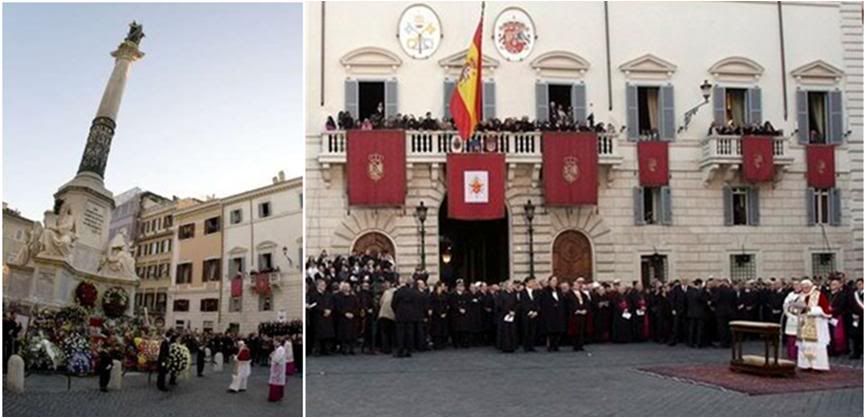
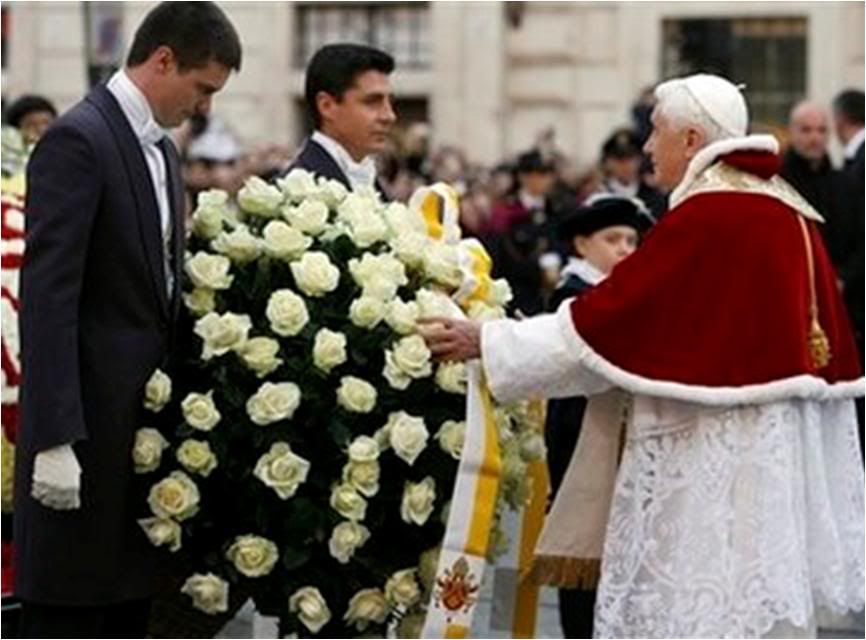
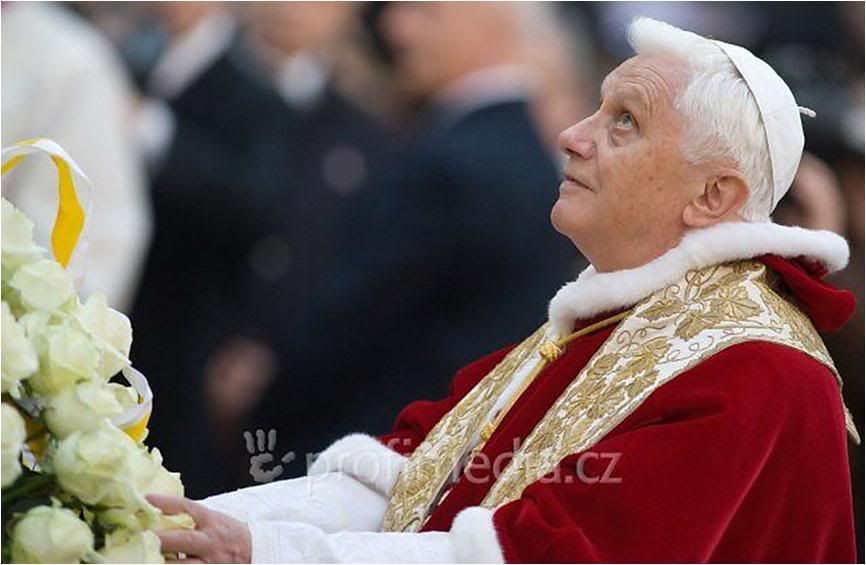 Pope Benedict opens Rome's holiday season
Pope Benedict opens Rome's holiday season
with a prayer for the jobless

ROME, Dec. 8 (AP) — Pope Benedict XVI is praying for those who lost jobs or are struggling to pay bills as Rome's holiday season began with a traditional appearance by the pontiff near the Spanish Steps.
Thousands of Romans and tourists crowded into the square near Rome's posh shopping streets to hear Benedict pray Monday afternoon near a statue of the Virgin Mary.
Rome's holiday season begins every Dec. 8, when the Pontiff arrives in his popemobile in the square at the foot of the Spanish Steps.
Benedict said he was asking the Virgin Mary to help families struggling to make ends meet and those who can't find work or who have just lost their jobs. He said he hoped those suffering would feel the "warmth of God's love."
On Sunday, the Pope called for prayers for the soul of Russian Orthodox Patriarch Alexy II, who died Friday at the age of 79.
Benedict said during his blessing from his studio window above St. Peter's Square that they were united with their "Orthodox brothers" in praying for Alexy's soul.
Relations between the Vatican and the Russian Orthodox Church have been strained over Orthodox accusations that the Vatican was poaching converts in former Soviet nations. The Vatican denies that.
Also this weekend, workers set up the Vatican's Christmas tree that arrived in St. Peter's Square from Austria.
The Vatican says the 109-foot red spruce has come from the forests of the Piesting valley in Austria. Another 40 smaller trees arrived Friday to decorate Pope Benedict XVI's private quarters, as well as Vatican offices.
The official lighting ceremony is on Dec. 12.
The tree will be adorned with 2,000 Christmas balls and topped with a shining star. It stands beside a life-size nativity scene that will be unveiled on Christmas Eve.
Christmas trees have only been placed in the square since 1982, when Polish-born Pope John Paul II began the northern European tradition.
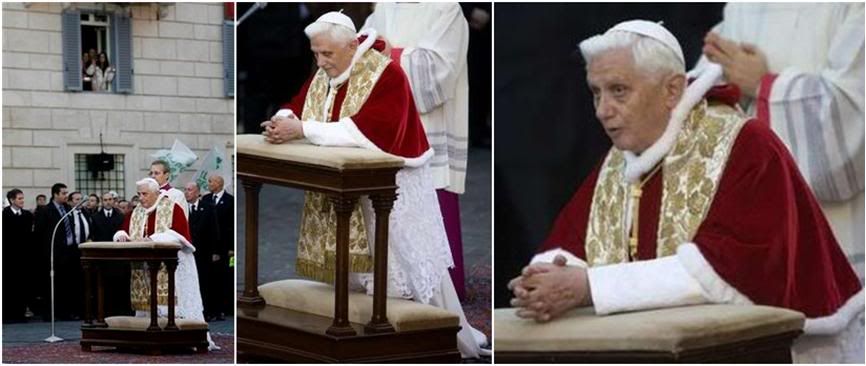
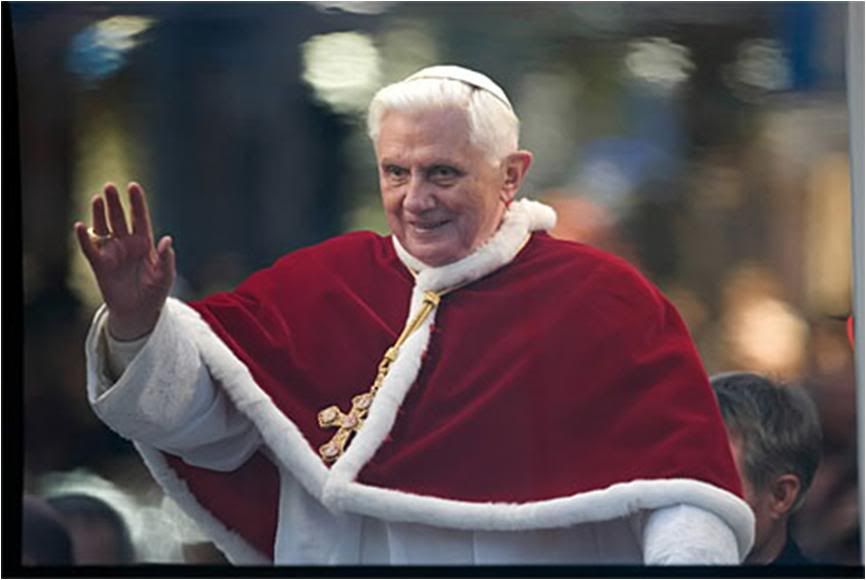
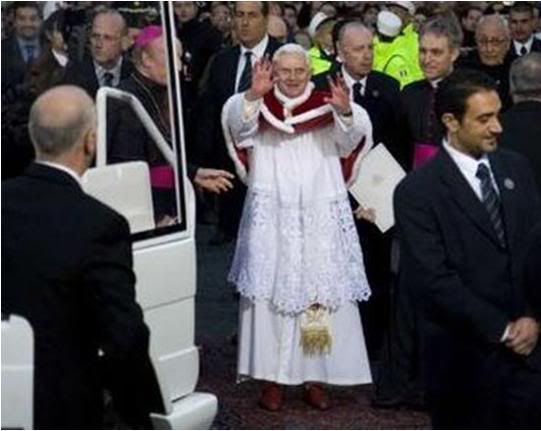
12/10/08
p.s. Having been gone most of the day on Monday, I was remiss in checking out Caterina's videocap montage which have become an indispensable supplement to the by-rote photocoverage we get from the news agencies (to whom we are, of course, always grateful and appreciative).
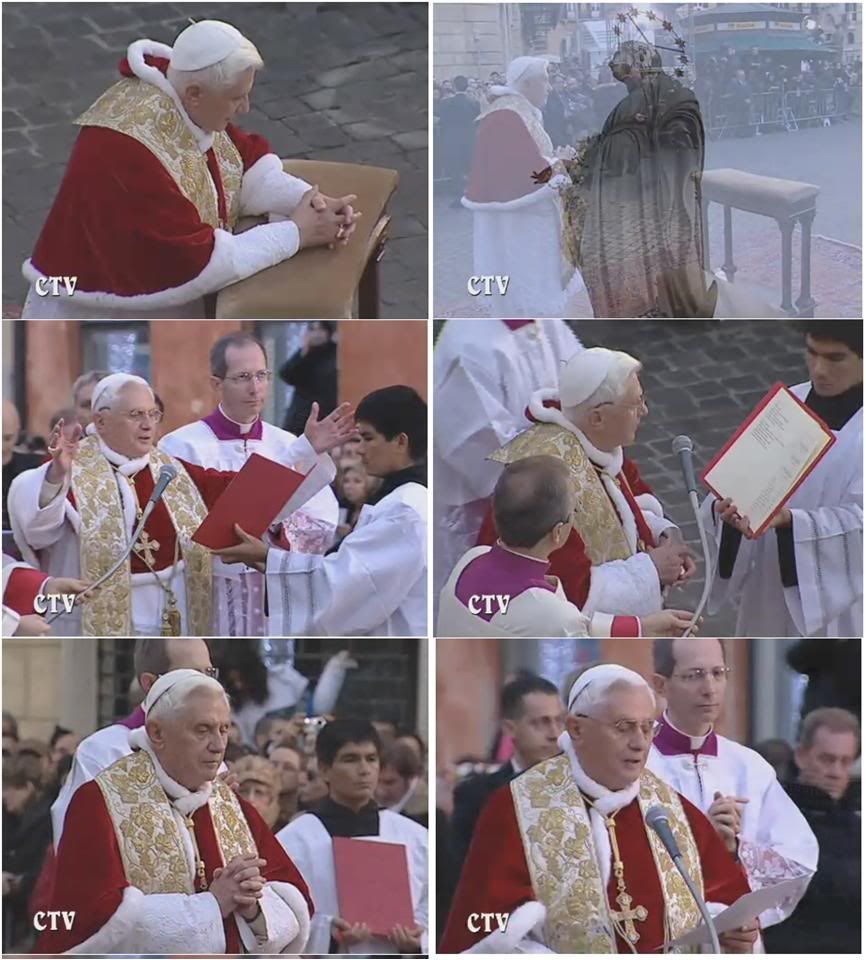
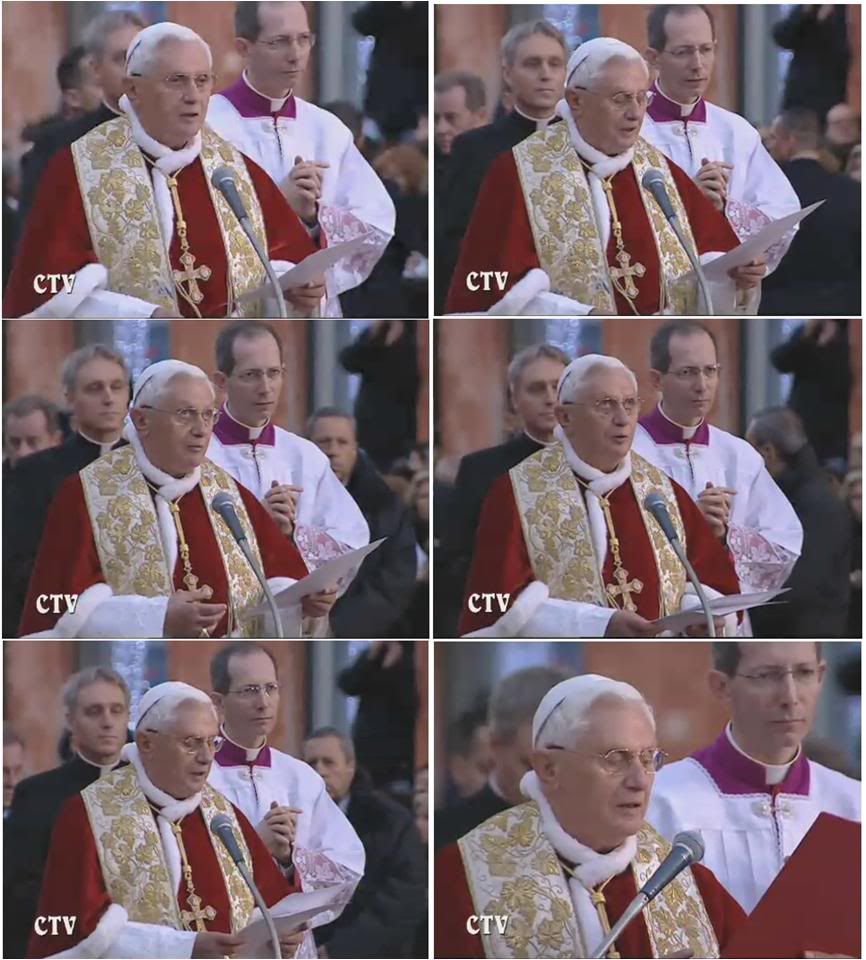
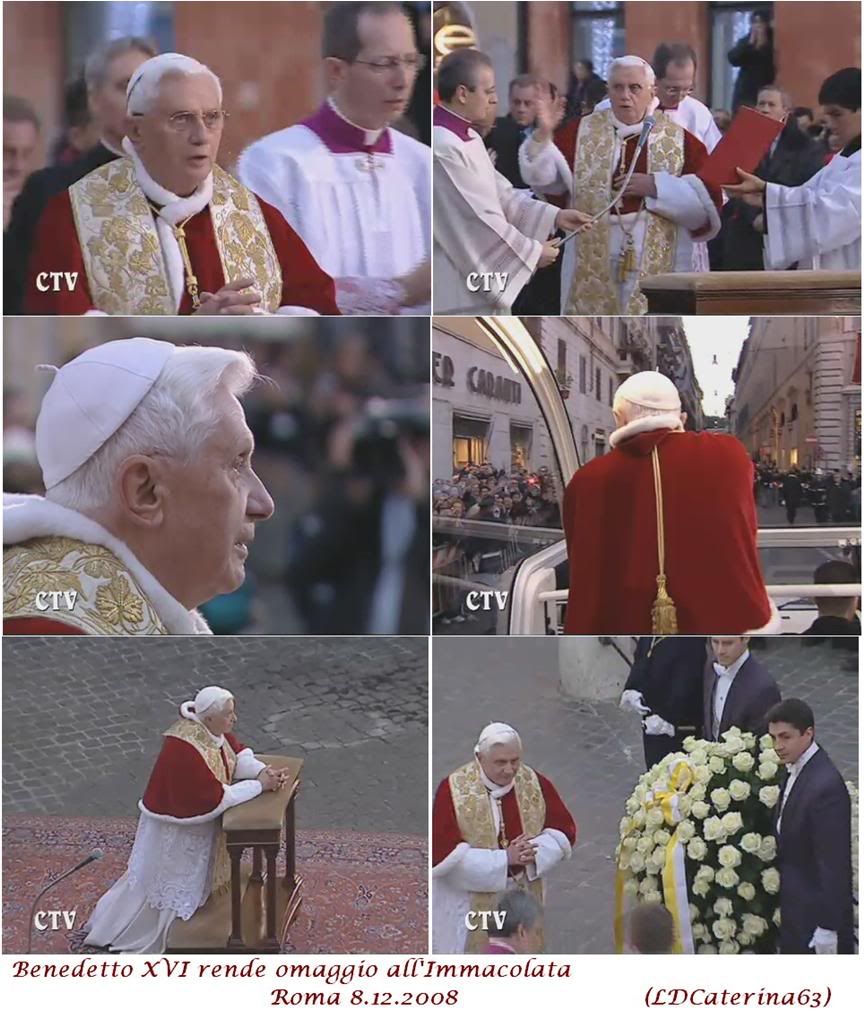
[Modificato da TERESA BENEDETTA 11/12/2008 11:39] |
 09/12/2008 02:07 09/12/2008 02:07 |
|
| | | OFFLINE | | Post: 15.917 | Registrato il: 28/08/2005
| Utente Gold | |
|
 Pope will venerate
Pope will venerate
Padre Pio on June 21

SAN GIOVANNI ROTONDO, Dec. 8 (Translated from ADN-Kronos) - The Holy Father will be visiting the shrine of St. Padre Pio of Pietrelcina next June 21, the Archbishop of this diocese announced after evening Mass today.
Mons. Domenico D'Ambrosio prefaced his announcement by saying, "The Holy Father has accepted our wish" before reading the letter sent to him by the Pontifical Household setting the date.
Cardinal Tarcisio Bertone, Vatican Secretary of State, had announced the Pope's visit in 2009 when he celebrated the saint's anniversary Mass last September, but no date had been set.
"Accepting the invitation you have sent him," the letter from the Vatican read, "the Holy Father has decided that he will visit San Giovanni Rotondo on Sunday, June 21, 2009."
Since April 2008, when it was exhumed, the mortal remains of the saint have been on display in the Church of Santa Maria delle Grazie where he was buried 40 years ago.
According to the bishop, the Pope will arrive by helicopter which will land at the sports field of the town, and will then ride in the Popemobile to Madonna delle Grazie, where he will celebrate Mass and lead the Angelus.
In the afternoon, he will visit the hospital Casa Sollievo della Sofferenza (Relief from Suffering) and then have an encounter with young people.
Mons. D'Ambrosio said he hoped the Pope would also go through the main streets of the town in the Popemobile.
The Mass today was attended by the provincial auhtorities of the province of Foggia, where San Giovanni Rotondo is located, and by the Provincial head of the Capuchin Friars, who are in charge of the two churches dedicated to padre Pio in San Giovanni Rotondo (the other is the modern new Shrine.
Two other Italian dioceses
announce papal visits in 2009
Translated from

Dec. 9, 2008
Montecassino, San Giovanni Rotondo, Viterbo.
These will be the destinations for three pastoral visits in Italy by Benedict XVI in 2009.
Al three visits were announced by their respective bishops at Mass yesterday, the feast of the Immaculate Conception.
The first of the visits will be to Montecassino on May 24. The abbot of the famous Benedictine monastery on the mountain, dom Pietro Vittorelli, announced that the Pope will also visit the nearby Polish cemetery to commemorate the sacrifices of so many Allied soliders who, in the first months of 1944, tried several times to capture the mountain from the Germans.
On June 21, the Pope will visit San Giovanni Rotondo to pray before the remains of St. Padre Pio of Pietrelcina. This was announced by Bishop Domenico D'Ambrosio.
The third visit will be to Viterbo and Bagnoregio on Sept 6, announced by Mons, Lorenzo Chiarinelli, Bishop of Viterbo.
NB: Bagnoregio is the birthplace of St. Bonaventure, the Seraphic Doctor, and one of Joseph Ratzinger's early subjects of study. Montecassino is of course the site of St. Benedict's most famous monastery (and where Cardinal Ratzinger gave the interview that resulted in the book God and the World).
[Modificato da TERESA BENEDETTA 09/12/2008 20:44] |
 09/12/2008 05:00 09/12/2008 05:00 |
|
| | | OFFLINE | Post: 3.465 | Registrato il: 23/11/2005
| Utente Master | |
|
Roses and thorns: Pope lays achievements, concerns at feet of Mary
By Cindy Wooden
Catholic News Service
December 8, 2008
ROME (CNS) -- Laying a basket of white roses at the foot of a statue of Mary, Pope Benedict XVI said Catholics can lay everything at the feet of their heavenly mother.
"Symbolically, these roses can express everything beautiful and good that we have done during the year," the pope said during his visit to the center of Rome Dec. 8 for the traditional ceremony alongside the statue of the Immaculate Conception near the Spanish Steps.
"But, as the saying goes, 'Every rose has its thorn,' and the stems of these stupendous white roses are not lacking thorns, which represent the difficulties, sufferings and ills that have marked and still mark the lives of people and of our community," the pope said.
Under brilliantly sunny skies, bundled up against a crisp chill, thousands of Romans and tourists jammed the square around the Spanish Steps to see the pope and pray with him.
Offering the roses to Mary, the pope also entrusted to her his special prayers for children, particularly those who are sick, disadvantaged or suffering because of family problems.
He prayed for elderly people living alone, for the sick, for immigrants struggling to build a new life in a new country, for families who barely make ends meet and especially for people who recently have lost their jobs.
"Mary, teach us to be in solidarity with those who are in difficulty, to bridge the increasingly vast social disparities; help us cultivate a livelier sense of the common good," Pope Benedict prayed.
The pope said the beauty of Mary, conceived without sin, "assures us that the victory of love is possible; in fact, it is certain. It assures us that grace is stronger than sin and therefore it is possible to be redeemed from any form of slavery."
The example of Mary's life helps Christians believe in goodness, graciousness, service, nonviolence and the power of truth, he said.
"She encourages us to remain wakeful, not to give in to the temptation of easy escapes, but to face reality with all its problems with courage and responsibility," Pope Benedict said.
The pope said that, looking up at Mary, Christians experience the same sensation a child has when looking up at his or her mother "and, seeing her smile, forgets every fear and pain."
"Turning our gaze to Mary, we recognize in her the smile of God, the immaculate reflection of divine light, and we find new hope even in the midst of the problems and dramas of our world," Pope Benedict said.
Earlier in the day, the pope recited the Angelus with visitors gathered in St. Peter's Square.
He said the feast of the Immaculate Conception reminds Catholics of two basic church teachings: the existence of original sin and the fact that, through Christ, God has redeemed those who believe.
The pope also noted that Dec. 8 marked the end of the yearlong celebrations of the 150th anniversary of the apparitions of Our Lady of Lourdes, who identified herself to St. Bernadette Soubirous as "the Immaculate Conception."
|
 09/12/2008 05:03 09/12/2008 05:03 |
|
| | | OFFLINE | Post: 3.466 | Registrato il: 23/11/2005
| Utente Master | |
|
Pope may visit Jordan along with Israel
December 8, 2008
VATICAN CITY (AFP) — Pope Benedict XVI may visit Jordan as well as Israel during a possible trip next year, the visiting Latin Patriarch of Jerusalem, Monsignor Fouad Twal, told the ANSA news agency on Monday.
The trip "may be broadened to include other stops," Twal was quoted as saying, adding: "I suppose the pontiff will begin his visit in Jordan" as earlier popes have done.
However, the trip remains uncertain, he said. "I'm afraid that if we wait until the time is ripe another two or three pontiffs may come and go," he added.
The Israeli daily Haaretz last month said the pope was planning to visit holy sites in Jerusalem and Bethlehem during the second week of May.
The Vatican confirmed only that diplomatic contacts had begun on a possible papal trip to Israel next year.
Twal said details would be finalised soon and that the pope might announce the trip on Christmas Day, December 25.
The patriarch is at the Vatican for the world meeting of the Equestrian Order of the Holy Sepulcher of Jerusalem, which takes place every five years.
Relations between the Vatican and Israel have been strained by the Vatican's decision to press ahead with the process of beatifying controversial World War II-era Pope Pius XII, criticised for his inaction during the Holocaust.
Italy's Fascist dictator Benito Mussolini introduced race laws that from 1943 led to the deportation of more than 8,000 Italian Jews to Nazi death camps.
Historians have pointed out Pius also failed to speak out for more than 1,000 Jews arrested on October 16, 1943, as Nazi troops sacked Rome's Jewish ghetto. Only 15 ever returned from the concentration camps.
Pope Paul VI was the first pontiff to visit Israel, in 1964, and Pope John Paul II visited in 2000.
|
 09/12/2008 15:03 09/12/2008 15:03 |
|
| | | OFFLINE | | Post: 15.922 | Registrato il: 28/08/2005
| Utente Gold | |
|

No OR today, and no schedule of events for the Holy Father. But a long-expected announcement was finally made.
CARDINAL CANIZARES APPOINTED
TO SUCCEED CARDINAL ARINZE
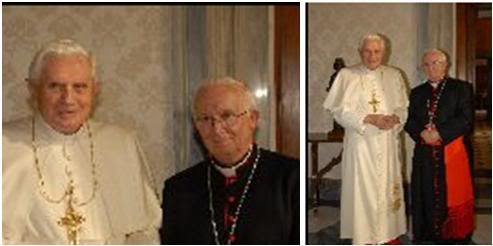 Cardinal Canizares with the Holy Father after their audience last November 20.
Cardinal Canizares with the Holy Father after their audience last November 20.
The Holy Father has accepted the resignation presented by Cardinal Francis Arinze, having reached canonical retirement age, as Prefect of the Congregation for Divine Worship and the Discipline of Sacraments, and has asked Cardinal Antonio Canizares Llovera, Archbishop of Toledo (Spain), to succeed him.
The Vatican also released the text of the Holy Father's letter to Cardinal Jean-Louis Tauran, President of the Pontifical Council for Inter-Religious Dialog, and Archbishop Gianfranco Ravasi, president of the Pontifical Council on Culture, on the Day of Study held December 4 on the subject "Cultures and Religions in Dialog" at the annual intercultural dialog promoted by the European Union.
The following item has been reported earlier - namely, that there will be a concert for the Pope this week to mark the 60th anniversary of the Declaration of Human Rights, but this gives it a fresh lead.
First female conductor will lead
German orchestra at performance
for Pope Benedict tomorrow

Frankfurt an der Oder, Germany, Dec. 9 (dpa) - A German orchestra which is to perform at the Vatican Wednesday believes it is the first ever conducted by a woman to perform for a Pope.
The Brandenburg State Orchestra of Frankfurt an der Oder is be headed by Inma Shara at the event, which marks International Human Rights Day.
Germany has two cities named Frankfurt. Shara and her 92 musicians come from the smaller Frankfurt, which is on the Polish border. [The better-known Frankfurt is Frankfurt-am-Main.]
They are to play works by Felix Mendelssohn Bartholdy, Wolfgang Amadeus Mozart, Amilcare Ponchielli and Manuel de Falla.
An orchestra publicist in Frankfurt said 6,000 people would be in the papal audience room for the Rome concert, including Pope Benedict XVI and the Rome diplomatic corps.
[Modificato da TERESA BENEDETTA 10/12/2008 05:17] |
 09/12/2008 20:37 09/12/2008 20:37 |
|
| | | OFFLINE | | Post: 15.927 | Registrato il: 28/08/2005
| Utente Gold | |
|
 'The Christian roots of Europe are alive':
'The Christian roots of Europe are alive':
Benedict XVI's new letter on dialog
Here is the text of the December 3 letter from the Holy Father to the presidents of the Pontifical Councils for Inter-Religious Dialog and for Culture released by the Vatican today. It is also the main story on the Dec. 9-10 issue of L'Osservatore Romano.
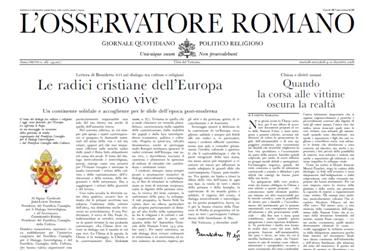
To Cardinal Jean-Louis Tauran,
President of the Pontifical Council
for Inter-Religious Dialog
and Archbishop Gianfranco Ravasi,
President of the Pontifical Council for Culture
I wish, first of all, to express my sincere appreciation for the joint initiative of the Pontifical Council for Inter-Religious Dialog and the Pontifical Council for Culture, in organizing a Day of study dedicated to the subject "Cultures and Religions in Dialog" as the participation of the Holy See in the European Union initiative, approved in December 2006, to declare 2008 as the European Year for Inter-Cultural Dialog.
I greet cordially, along with the Council Presidents mentioned, the cardinals, the venerated brothers in the E[Episcopate, the excellencies of the diplomatic corps accredited to the Holy See, the representatives of other religions and all the participants in this important meeting.
For many years now, Europe has become aware of its substantial cultural unity, despite the constellation of national cultures that have shaped its face.
It is good to underscore this: contemporary Europe, facing the Third Millennium, is the fruit of its 2000 years of civilization. That civilization is deeply rooted in the enormous and ancient patrimony of Athens and Rome as well as, and above all, in the fecund soil of Christianity, which has shown itself capable of creating new cultural patrimonies even as it accepts the original contribution made by every civilization.
The new humanism, which emerged from the spread of the evangelical message, exalts all the elements of the human being and his transcendental calling, purifying it of the wastes which obscure the face of the man created in the image and likeness of God.
Thus, Europe appears to us today like a precious fabric, whose warp and woof is formed by the principles and values drawn from the Gospel, even as the national cultures have been able to embroider it with an immense variety of perspectives which manifest the religious, intellectual, technical, scientific and artistic capacities of homo Europeus.
In this sense, we can affirm that Europe had and still has a cultural influence on the entire human species, and cannot fell less than particularly responsible not only for its future but for that of all mankind.
In the context of today, when our contemporaries are more often asking themselves the essential questions on the sense of live and its value, it seems more important than ever to reflect on the ancient roots from which have flowed abundant lymph in the course of centuries.
The subject of inter-cultural and inter-religious dialog emerges as a priority for the European Union and is of interest across the board to all sectors of culture and communications, of education and science, of migrants and minorities, and those of young people and work.
Once diversity is accepted as a positive given, persons must accept not only the existence of the other's culture, but that they also wish to be enriched by that culture.
My predecessor, the Servant of God Paul VI, addressing Catholics, expressed his profound conviction about this in these terms: "The Church should enter into dialog with the world in which she lives. Let the Church give its word, let the Church deliver its message, let the Church enter into conversation" (Encyclical Ecclesia Suam, N. 67).
We live in what is now usually called 'a pluralistic world', characterized by the rapidity of communications, the mobility of peoples and their economic, political and cultural interdependence.
Even in these often tragic times - even if many Europeans unfortunately seem to ignore the Christian roots of Europe - these roots are alive, and they should mark the way and nourish the hopes of millions of citizens who share the same values.
Believers should therefore be always ready to promote initiatives of inter-cultural and inter-religious dialog with the end of stimulating collaboration on areas of reciprocal interest, such as the dignity of the human being, the search for the common good, the construction of peace, development.
To this end, the Holy See wished to highlight its own participation in the 'high-level dialog on understanding among religions and cultures and on cooperation for peace' at the 62nd General Assembly of the United Nations (Oct. 4-5, 2008).
In order to be authentic, such a dialog must avoid yielding to relativism and syncretism, and must be animated by sincere respect for others and a generous spirit of reconciliation and brotherhood.
I encourage all those who are dedicated to the construction of a Europe that is welcoming, fraternal and ever more faithful to its roots, and in particular, I call on believers to contribute not only to jealously preserve the cultural and spiritual heritage which distinguishes them and are an integral part of their story, but also to be even more committed to finding new ways to adequately meet the great challenges that mark the post-modern world.
Among these, I will limit myself to cite the defense of human life at every stage, the protection of the rights of individuals and of families, the construction of a just and fraternal world, respect for creation, and inter-cultural and inter-religious dialog.
In this perspective, I wish success for the Day of Study and I invoke on all of its participants the abundant blessings of God.
From the Vatican
December 3, 2008

[Modificato da TERESA BENEDETTA 09/12/2008 20:39] |
|
|
|
|